HIGH NOON FOR THE HIGH STREET VAPES VAPES VAPES CANDY STORE Winter 2023 | www.journaloftradingstandards.co.uk From illicit vapes to rip-off candy stores, the UK’s high streets are fast becoming a Wild West battleground for Trading Standards ✚ Food allergens Why getting labelling right can prevent tragedies ✚ View from the ground The realities of enforcement as the cost of living rises ✚ New recruits How to inspire Trading Standards’ next generation ✚ Keeping kids safe A new digital standard could protect children online CLOSING DOWN EVERYTHING MUST GO SALE FIREWORKS TOBACCO & MOBILES SHORT-TERM LET PAY-DAY LOANS

STRENGTH TO SERVE
My time as CTSI Chair coincides with a period of significant difficulty for businesses and consumers as the country grapples with the cost-of-living crisis and a host of other challenges. The role of Trading Standards and consumer protection has rarely been more important, and we all have vital work to do to ensure that society’s most vulnerable are not the hardest hit by the wave of scams, counterfeit goods and dangerous products that the crisis is giving rise to.
In order for Trading Standards to be strong enough to serve society, I believe we must make the profession more inclusive, more diverse and more respectful of its people. We must do more to attract younger members and during my tenure as Chair I am working with CTSI and others to align our professional qualification with apprenticeships so that we can broaden the already impressive pool of talent we draw upon.
We must also do more to attract members from different walks of life – whether that means people from different professions, or people of different ethnic, social and religious backgrounds, as well as promoting gender and sexual equality. By making the Trading Standards profession representative of society as a whole, we will be better able to understand the challenges communities and businesses face, encouraging compliance and raising awareness in order to prevent the harmful behaviours which we fight against.
And we must strengthen our ties with other public protection bodies and organisations, engaging more with politicians, local councillors and the media to promote the message that a properly resourced Trading Standards service is crucial to the country’s wellbeing and its economic recovery.
The first step to all of this is listening; listening to consumers, listening to businesses and, importantly, listening to one another. By building a kinder, more accepting and more respectful Trading Standards profession, we can make the most of the opportunities that the current situation presents, so that when things do improve, Trading Standards remains a relevant and robust part of the country’s future.
Guest Editor: Kerry Auger

Editor: Richard Young
Designer: Sam Millard
Consultant: Paul Thomas Evans

Lead Developer: Michael Sadler
Videographer: Panji Kaonga
Contributors: Marion Wilson, Susan Tolman Writers: Matt Allwright, Helen Nugent, Richard Young
Article suggestions and feedback should be sent to: editor@JournalofTradingStandards.co.uk
The Journal of Trading Standards magazine and website are produced on contract by Fourth Estate Creative Ltd. www.fourthestatecreative.com connect@fourthestatecreative.com
Printed in the UK by Manson Group Distributed by Gold Key Media
Published by the Chartered Trading Standards Institute, 1 Sylvan Court, Sylvan Way, Southfields Business Park, Basildon SS15 6TH.
www.tradingstandards.uk 01268 582 200
© 2023, Chartered Trading Standards Institute. All rights reserved.
Views expressed by the authors are not necessarily the views of CTSI.

www.JournalofTradingStandards.co.uk | 03
Tendy Lindsay Chair, CTSI
Leader WINTER 2023 Journal of Trading Standards
“We must make the profession more inclusive, more diverse and more respectful”
Editorial
Kerry is Guest Editor of JoTS.
Richard is Editor of JoTS.
Matt Allwright

Matt is a journalist and presenter of the BBC’s Watchdog and Rogue Traders












Duncan Stephenson
Duncan is Director of Policy and External Affairs at CTSI.
Chief Executive, CTSI
John has held various roles in commercial, local government and non-profit organisations.











Tendy Lindsay
Chair, CTSI
Tendy sits on the CTSI Council and is Chair of the CTSI Race & Equalities Working Group.



Immediate past-Chair, CTSI
Louise is CTSI Lead Officer for Consumer Advice & Education and Head of the NTS Scams Team.






5 Paper Buildings
Andrew Johnson and Miles Bennett are barristers at 5 Paper Buildings and specialists in consumer law.


Chief Inspector, Northern Ireland Trading Standards Service
Damien focuses on scams and doorstep crime.
Trading Standards Manager, Highland Council
David is a CTSI Lead Officer for e-Commerce.
Prof Louise M Hassan

Professor of Consumer Psychology, Bangor Business School
Business Companion
Business Companion is a free online resource developed by CTSI with the support of the Department for Business, Energy and Industrial Strategy.
Service Director Profession Relationships, CTSI
Phil has experience across private, public and not-forprofit sectors with a focus on regulatory outcomes.
Manager, Monmouthshire Trading Standards Service
Team Manager - North West Team (Queens Park & Harrow Road wards)
Gareth is Branch Secretary for Wales and Chair of the Welsh Animal Health Panel. Giles is a Trading Standards Officer and sits on the Race & Equalities Working Group.


04 | Winter 2023
John Herriman
Phil Owen Giles Speid Gareth Walters
Damien Doherty David MacKenzie
COLUMNS
EDITORIAL BOARD
CONTRIBUTORS
CPPD
LEGAL
Louise Baxter
Kerry Auger
Richard Young
EDITORS
Louise specialises in understanding consumer protection issues. WINTER 2023 Journal of Trading Standards
08
| Upfront
Our regular look at success stories, statistics and the recent activities of Trading Standards professionals.
17
| Opinion: Matt Allwright
By shifting our shopping habits away from the high street, has online retail undermined consumers’ rights to redress?
24
| Opinion: John Herriman
Amidst all the recent disruption and instability, there are reasons for optimism.
26
| Rethinking regulation
The theoretical underpinnings of much of our regulation are due for an overhaul, believes Professor Chris Hodges.
28
| Opinion: Duncan Stephenson
Over the coming months and years, CTSI will be taking a more visible, more proactive stance on a range of issues.
34
| Many happy returns
As the UKICC marks its 15th anniversary, Susan Tolman reflects on the vital role the service plays in empowering consumers. 39 |
Gold standard
Robert Grice’s latest book takes a trip through time to examine a fascinating subject that still resonates today.
40
| Spotlight on hallmarking
As well as upholding the oldest form of consumer protection, the BHC champions innovative new enforcement initiatives.
48
| CPPD
Examining the responsibilities of retailers to comply with the law on knife sales.
52
| Legal: words and meaning
Why quibbles over semantic nuances can have repercussions for prosecutions.
58
| Last Word
As he steps down from his role as a CTSI Lead Officer, Peter Stonely looks back on an illustrious career in Trading Standards.

All change on the high street
From illicit vapes to rip-off candy stores, the UK’s high streets have become a battleground for Trading Standards.

Lord Michael Bichard
The National Trading Standards Chair on the importance of consumer protection –and why cuts to resources put lives at risk.
Back to school
Ellis Donaldson, one of Trading Standards’ younger Officers, talks about what the profession can do to attract fresh talent.

Baroness Beeban Kidron

The children’s rights campaigner talks about the introduction of a new standard to bolster protections for children online.
A
matter of life and death
Following the introduction of Natasha’s Law, have businesses got the message that pre-packaged food must declare allergens?

Best of the best
The CTSI Hero Awards 2022 recognised some of those whose tireless work makes them true Trading Standards heroes.

| 05 www.JournalofTradingStandards.co.uk NEWS & FEATURES
COVER STORY FEATURE FEATURE
INTERVIEW
18
30 36
FEATURE
42
54
FEATURE
WINTER 2023 Journal of Trading Standards
46 Contents
Upfront
CONSUMER APPG
CTSI has been appointed as the secretariat to the All Party Parliamentary Group (APPG) on Consumer Protection and is working with the members of the Group on a workplan of activity. Several MPs and peers, including CTSI President Lord Lindsay, and Vice Presidents Baroness Crawley and Carolyn Harris MP, have agreed to support the APPG.
SHOPS SUPPORT RULES
Most retailers support existing tobacco laws and have even called for tougher regulation, according to a survey by Action on Smoking and Health (ASH). “The majority support existing regulations and want Government to go further including by raising the age of sale for tobacco to 21,” said Bob Blackman MP, Chair of the APPG on Smoking and Health.
SCAMS VULNERABILITY
National Trading Standards (NTS) research shows that for one in four UK adults, being scammed out of just £100 would cause serious financial hardship. In its annual strategic assessment on emerging threats to consumers and businesses, NTS revealed that people are more vulnerable to being scammed than this time last year.
TSS LOFT SCAM WARNING
Trading Standards Scotland (TSS) has sounded the alarm about cold-callers engaging in high-pressure sales tactics to install spray foam insulation in lofts. Fiona Richardson, TSS Chief Officer, said: “Dishonest traders are exploiting the costof-living crisis and targeting those who want to make their homes more energy-efficient.”
LBBD fights underage sales
Officers from the London Borough of Barking & Dagenham (LBBD) Trading Standards carried out a series of underage sales compliance checks in 2022 as part of the service’s continuing work to safeguard young people from potentially harmful products including knives, alcohol, tobacco and vapes.
Nazir Ali, Trading Standards Team Manager at LBBD, explained: “A knife in the wrong hands could end up having severe consequences, and if we can prevent people having access to tobacco at an early age, the risk of them becoming addicted is minimised.
“Vapes have flooded the market and are a priority for the borough and across London.”
As part of its ‘Summer of Action’, the LBBD team conducted 83 visits with underage test purchasers and a total of 10 businesses failed the checks (see graph).
“All of the test purchasers were young volunteers,” said Ali. “My priority is to forge partnerships wherever we can; because of a lack of resources we have to work with different services. For this,
we linked up with the Barking & Dagenham Youth Service, who supplied young people in the 14 to 16 age group.
“We generally operate a zerotolerance policy across all agerestricted sales. However, every incident is assessed on a case-bycase basis. We have seen failures across independents and small retailers, but it can happen with supermarkets as well. Even when they have all the due diligence in place, they still occasionally do fall foul of the law.
“There are prosecutions lined up for some of these premises,” Ali added.
TS tackles avian flu outbreak
Trading Standards services are working with the Animal and Plant Health Agency (APHA) and the Department for Environment, Food and Rural Affairs (DEFRA) to contain the largest ever outbreak of avian influenza in the UK.
CTSI Lead Officer for Animal Health & Welfare, Stephanie
Young, said: “There is a lot of concern of cases within backyard flocks and it is important that all owners of poultry remain vigilant for signs of the disease, and follow good bio-security measures. We are in the process of setting up foot patrols and it is very resource-intensive.
In addition to being a legal obligation, tackling noncompliant sales of age-restricted products can be a powerful way of demonstrating the value that Trading Standards brings to local communities, Ali believes. “Whenever we publicise this sort of work, we always get very good positive feedback from parents. They see it as a fundamental duty for local authorities to support the safety and wellbeing of children. That’s why we need to divert or prioritise resources in Trading Standards to control age-restricted products.”
For more on knife sales, see p48.
“APHA officials and Trading Standards officers from across the country are working hard to monitor and control further spread of the virus in what is an unprecedented outbreak.”
At Lincolnshire Trading Standards a partnership with the Fire Service proved fruitful when a fire station was set up as a forward operating base to help contain the spread of the disease.
60 SECONDS 06 | WINTER 2023
Journal of Trading Standards
Winter 2023
AGE-RESTRICTED SALES
ANIMAL HEALTH & WELFARE
50 40 30 20 10 0 n Number of test purchases n Number of failed test purchases
Alcohol Vapes Knives Tobacco
CTSI slams proposed Retained EU Law Bill
Under the banner of its Safeguarding Our Standards campaign, CTSI has led a coalition of organisations in raising concerns that the Retained EU Law (REUL) Bill could harm consumers and businesses.
CTSI Chief Executive John Herriman sent an open letter to Prime Minister Rishi Sunak, co-signed by organisations including the Chartered Institute for Environmental Health, the Royal Society for the Prevention of Accidents and Electrical Safety First, urging the Government to
scrap the Bill’s current deadline of 31 December, 2023.
REUL, which was proposed by former Business Secretary Jacob Rees-Mogg MP, would mean redrafting and potentially scrapping thousands of laws that affect food and product safety and consumer rights, as well as environmental protections and workers’ rights.
A survey of CTSI members found that the overwhelming majority (92.5%) believe that the Government should drop its commitment to sunset
legislation by 2023 and almost three-quarters (72%) said that an arbitrary timetable to sunset all EU-derived legislation should be abandoned altogether.
CTSI also commissioned a public survey, which found people are most concerned about loss of protections in areas including food safety, product safety and upholding laws that help enforcers crack down on scammers and rogue traders. This was mirrored by views from the Trading Standards profession, with product safety, food safety and fair trading being key concerns.
CTSI's poll revealed that the public think the Government and Parliament should prioritise their time to deal with the costof-living crisis and take action to
COMMUNITY SERVICE
tackle NHS waiting lists. REUL was ranked last by the public in a list of things the Government should be focused on.
Herriman said: “These findings confirm our fears around the current timetable for REUL.

Rushing to overhaul vast swathes of UK legislation, particularly when the country faces such an unprecedented set of other challenges, is not something that those of us working in Trading Standards or consumer protection want.”
Yvonne Fovargue MP said: “This campaign is, rightly, not about refighting battles about Brexit. It’s about ensuring that we have good regulation in place that protects consumers and keeps people safe.”
Read CTSI's open letter on p16.
Trading Standards enforcement and prevention activities are safeguarding communities across the UK
Derby cuts out knives

Rotherham nabs vapes
Working with South Yorkshire Police, Rotherham Trading Standards Officers have seized more than 5,000 illegal vapes across the borough with an estimated retail value of around £50,000. Out of 20 premises visited, 19 had non-compliant products on sale. Some vapes seized contained nicotine levels up to 10 times the legal limit.

Derby City Council has carried out a joint operation to crack down on knife crime. Trading Standards Officers joined police colleagues to carry out test purchases to check whether retailers would sell knives to underage customers. The test purchases were part of Operation Sceptre, a campaign to reduce illicit knife sales across the UK.
Fireworks fizzle out
Illegally stored fireworks worth between £6,000 and £10,000 were seized by North Lanarkshire Council’s Trading Standards Officers, assisted by Police Scotland, from an unlicensed premises in November. The fireworks were stored alongside a gas fire and canister, flammable materials and liquids, and in the same unit as a running car.

Victims compensated Buckinghamshire & Surrey Trading Standards Officers are returning thousands of pounds to people who have been defrauded by an international lottery scam. In a landmark investigation the National Trading Standards Team, hosted by Surrey County Council, identified US-based fraudsters who targeted UK households.
Rogue builder jailed
A rogue builder whose victims included a disabled pensioner has been jailed for 10 months following an investigation by Pembrokeshire County Council Trading Standards. Scott Keane carried out shoddy and overpriced work on roofs and chimneys which was subsequently deemed unsafe and required expensive remedial work.

WINTER 2023 | 07 Journal of Trading Standards
www.JournalofTradingStandards.co.uk
POLICY
Upfront
IN THE FIELD
Trading
Standards activities have included tackling counterfeits and cracking down on street drinking
Fake food rating
A restaurant which faked its food hygiene rating has been fined following an investigation by London Borough of Islington Trading Standards. ‘Healthy fast-food restaurant’ Fit Kitchen, based in Farringdon, was found guilty of three offences at Highbury Magistrates’ Court on 14 September 2022. The business made unauthorised use of the highest food hygiene rating on its website and on online delivery platforms when in fact the restaurant’s food handling and cleanliness were found to be ‘generally satisfactory’, and the management of food safety was declared ‘good’. The business was fined £10,000 and company director Amar Lodhia was fined £5,000. Both parties were also ordered to pay costs of £20,650 to Islington Council.
Green energy fraudster
A director of two 'green energy' companies has been jailed for 30 months after a prosecution by Kent County Council Trading Standards. Danny Welch was found guilty on three counts of fraud by false representation. Her Honour Judge Brown in sentencing said that Welch “seized any opportunity to make a profit” and said the sentence “must reflect the seriousness of the offences”.

Conmen found guilty
Two rogue traders who tricked elderly people into handing over tens of thousands of pounds have been sentenced. Jamie Anderson and Michael Hickey pressured victims into paying for alarm systems and energy-efficiency home improvements. They then failed to carry out the work or overcharged for it. A prosecution brought by Cheshire West and Chester Council following an investigation by the National Trading Standards North West Regional Investigation Team resulted in a guilty verdict for both men. Anderson was sentenced to 22 months imprisonment, suspended for 24 months, and disqualified from being a director for six years. Hickey was given an 18-month Community Order and ordered to complete 150 hours of unpaid work.
South West vapes
A joint operation by Heart of the South West Trading Standards and Devon and Cornwall Police resulted in the seizure of illicit vapes with a street value of £7,400 from a shop in Plymouth. The seizure was made while TSOs visited retailers as part of the Operation Sceptre campaign against underage knife sales. The devices were surrendered by the store owner and will be disposed of.

Vapes linked to child sexual exploitation
Evidence has emerged that suggests a link between underage vaping and child sexual exploitation (CSE), with reports from across England and Wales that vapes have been supplied to children with the intention of grooming them.
It is understood that several live cases are currently under investigation by safeguarding teams and police.
Vapes are often marketed with child-friendly flavours and packaging, and they are promoted on social media.
Data from local Trading Standards teams shows a
significant increase in reporting of underage vape sales. While absolute numbers remain low, between May 2021 and July 2022 intelligence logs surged 1,958% and complaints reported to Trading Standards via Citizens Advice rose 1,367%.
John Herriman, Chief Executive of CTSI, said: “We are shocked to learn of intelligence reports that highly addictive vapes are being supplied and used to groom children for sexual exploitation. While it is reassuring that these isolated incidents are being investigated by police and safeguarding
teams, CTSI urges the public to be vigilant around businesses which may be selling vapes illegally to children and report them to Trading Standards through the Citizens Advice Consumer Helpline.
“We also urge anyone who suspects links around the supply of vapes with grooming and CSE to immediately report these suspicions to the police.”
National Police Chiefs’ Council lead for Child Protection, Deputy Chief Constable Ian Critchley, said: “We have seen instances where children have been given vaping products by offenders,
with the intention of grooming them. CSE is a form of child abuse where a victim is given something in exchange for sexual activity. Offenders target vulnerable young people and use their power to sexually abuse them.
“A common feature of CSE is that the child or young person does not recognise the coercive nature of the relationship and does not see themselves as a victim of exploitation. This means that they are unlikely to report the abuse so police and partners must be alert to the signs of CSE and actively look for victims.”
For more onvapes, see p18
08 | Winter 2023 WINTER 2023
Journal of Trading Standards
VAPES
FACTS & FIGURES
Office of National Statistics and National Trading Standards data shows how scammers are exploiting consumer vulnerability
of phishing scams involve fraudsters posing as delivery companies
1,235
reports of WhatsApp scam messages between February and June 2022 85%
increase in calls offering bogus energyefficiency grants in August-September*
11%
DISABLED CONSUMERS
A survey by Which? and the Research Institute for Disabled Consumers (RIDC) has found that some retailers are potentially breaking the law over returns for disabled shoppers. One in two disabled consumers who had to return an item in the past year experienced problems and 45% could not return the item via the retailer’s suggested method.
ONLINE MARKETPLACES
E-scooter fire risk warning Energy scams on the rise
A spate of fires caused by faulty lithium-ion batteries in electric scooters and bikes have prompted calls for new rules on the safe storage of the devices.
In London alone, firefighters have attended more than 130 blazes caused by e-scooters in just over a year. London Fire Brigade’s Assistant Commissioner for Fire Safety, Charlie Pugsley, said: “It’s incredibly concerning that we are continuing to see a rise in incidents involving e-bikes.
“When these batteries and chargers fail, they do so with ferocity and because the fires develop so rapidly the situation can quickly become incredibly serious. These items are often stored in communal areas and corridors, and can block people’s only means of escape.”
The Mayor of London, Sadiq Khan, has also expressed “serious concerns” that some lithium-ion batteries available on the web breach product safety laws.
“Conversion kits which allow people to convert a normal bike to an e-bike are the cause of many of the fires,” Khan said. “They have usually been bought from online marketplaces and may not meet the correct safety standards.”
Tim Farron MP and London Assembly Member Hina Bokhari have called for a public safety campaign to promote the safe storage and charging of e-bike batteries, and to discourage the purchase of the devices from disreputable suppliers.
Bokhari said: “Unless action is taken I fear that before long there will be a horrific fire in a home or block of flats involving the loss of lives.”
E-scooters and e-bikes have been banned from the London Underground and all parliamentary property because of potential fire risks.
“If Parliament decides e-scooters and e-bikes are a fire risk within their own buildings that should be a powerful wake-up call that greater safety measures are needed everywhere,” Bokhari added. If you have encountered e-bike issues, email policy@tsi.org.uk
CTSI has issued a stark warning about the rise in energy scams linked to the cost-of-living crisis and has called for a strategy to inform and protect consumers.
Of particular concern are scam energy rebate text messages and energy tariff mis-selling.
CTSI Lead Officer for Doorstep Crime, Katherine Hart, said: “There has been a huge surge in energy-efficiency scams offering rebates and offers to apply for grants.
“Some of the texts or emails we see ask people to click on a link that takes them to an official-looking platform where they are asked to submit personal information. This is a ruse to harvest data.”
CTSI Lead officer for Energy, Smart Meters and Climate Change, Steve Playle, said: “Consumers should ignore any messages and only deal directly with their energy company, using their published phone numbers and email addresses.”
Kevin Hollinrake MP has stated his support for Electrical Safety First’s call for better regulation of online marketplaces. Speaking at the charity's product safety conference, he said: “Many of us purchase goods online. We need to ensure that consumers can be confident that products bought online are as safe as those bought on the high street.”
IMPERIAL MEASURES
CTSI has urged the Government to rethink plans to reintroduce imperial measures after conducting research which suggests the project could cost taxpayers millions and confuse consumers and businesses. Almost one in five consumers said they were not confident that they could apply imperial measurements to their shopping.
RIP ALAN STREET
Alan Street, who worked for many years on the Institute’s behalf and inspired many in Trading Standards, passed away on 25 September 2022. Street led the Institute through a period of major change as its Secretary and then Chief Executive. CTSI owes him considerable thanks for his commitment, and sends sincere condolences to his family.
| 09 www.JournalofTradingStandards.co.uk WINTER 2023 Journal of Trading Standards
57 %
increase in general consumer fraud since before the COVID-19 pandemic began 54%
of
PRODUCT SAFETY SCAMS
people who replied to a phishing email provided personal financial information (Source: ONS; *NTS)
60 SECONDS
Reporting in
Explosives & Petroleum
Activities: I advised members on problems involving petroleum storage and explosives licensing. Of note was an enquiry regarding storage of petrol during the Open Golf Tournament at St Andrews.
Challenges: A new Fireworks Act has been introduced in Scotland which will cause enforcement to diverge significantly from the rest of the UK. I attended a meeting on CTSI's behalf and discussed the matter with representatives of the Scottish Government and the BFA.
Fair Trading & Pricing
Activities: I took part in a group with the Advertising Standards Authority (ASA) and others looking at pricing issues, and contributed to the Internet Intermediaries Working Group.
Challenges: Pricing is going to become more of an issue as consumers have less money. Packaging sometimes contains fewer items for the same price (shrinkflation) and prices for staple items are rising. Consumers want good value and are likely to be scammed by traders making offers which are too good to be true.
CTSI's Lead Officers produce reports every six months on their area of specialism, looking at current and upcoming threats and challenges, as well as recent activities and initiatives with which they have been involved.
Holiday & Travel Law
Activities: Problems presented by COVID-19, hold-ups at UK airports and the Hajj Pilgrimage are just three areas where I have been helping BEIS, the CMA, the CAA and CTSI members.
Challenges: Travel disruption continues and BEIS is reliant upon us providing the relevant information to highlight problems for consumers, business and enforcers. I am a member of the Air Travel Insolvency Protection Advisory Committee, which relies on us for comment on the current ATOL consultancy.
Intellectual Property Activities: I delivered an intellectual property (IP) masterclass at CTSI Conference and co-presented Birmingham Commonwealth Games IP Awareness training for TSOs, as well as attending various IP Crime Group and National Markets Group meetings.
Challenges: Work to stem the flow of online sales of counterfeit and pirate goods is ongoing. We will be progressing CTSI’s new IP Training Programme, a new partnership between CTSI and the IPO. The programme is aimed at delivering free training on IP issues for TSOs.
Food & Nutrition
Activities: I responded to consultations on healthy food environment (Wales); the restricted and prohibited products guide for internet platforms; and precautionary allergen labelling. I also attended food standards and information focus group meetings.
Challenges: The cost-ofliving crisis raises the risk of ingredient substitution for cheaper alternatives, or adulteration. Businesses are under severe financial pressures and are possibly cutting corners as a result. The rise in use of food banks is also a cause for concern.
Animal Health & Welfare
Activities: I attended several meetings including the TB Compliance and Enforcement Group for England & Wales, and the National Animal Health & Welfare Panel. I have been working with CTSI to lobby Government for changes to the Animal Welfare Act 2006 via the Kept Animals Bill.
Challenges: The cost-ofliving crisis is having an impact on the farming community and the cost of animal feeds for all livestock. The avian influenza outbreak continues to be a priority, as do other notifiable diseases.
Age-Restricted Sales
Activities: We continue to see a massive problem with single-use vapes appealing to children. There have also been reports from shopkeepers seeing an increase in aggression when sales are refused. The Khan Review contains some interesting recommendations, including raising the age of sale of tobacco by one year, every year, to create a smoke-free generation.
Challenges: There has been a delay in introducing the Online Safety Bill, which will hopefully make the internet a safer place for everyone, especially children.
eCrime Activities: Work continues in order to provide advice and assistance to members on emerging e-crime issues. An ongoing focus is liaising with the Real Deal Working Group, an initiative set up to protect intellectual property and tackle the sale of counterfeits and fakes online.
Challenges: It is important to monitor the progress of the Online Safety Bill as it makes its passage through Parliament and ensure that the voice of Trading Standards and consumer protection is heard when the Bill is being scrutinised.
eCommerce Activities: I have contributed to updates on CTSI guidance for members and delivered ad hoc advice to several members on request, mainly focused on the ICACs Regulations. The cost-of-living crisis has led to a sudden increase in importance of basic consumer protections in which Trading Standards has a key role.
Challenges: Assisting small businesses to use e-commerce effectively and fairly while continuing to recover from the pandemic and navigating the energy and cost-ofliving crises.
Doorstep Crime
Activities: I have provided a number of quotes to newspapers and have appeared on national TV to promote scams awareness. I have also been part of the TSS cost-of-living campaign and represented CTSI at a Scottish Government Scams Strategy group.
Challenge: The cost-ofliving crisis is very much an issue for businesses and consumers alike as they become increasingly vulnerable. New scams keep emerging and there has been a huge increase in scams of every form, including a rise in doorstep crime.
10 | WINTER 2023
Journal of Trading Standards Winter 2023
Energy Activities: I met with UKAS to raise issues regarding consumer protection in relation to renewable energy technologies. I have also been working with an energy consulting business to raise awareness about Trading Standards andconsumer vulnerability. Challenges: There has been a rapid increase in the number of people in fuel poverty, despite Government intervention on the back of unaffordable increases in the energy price cap. Energy security is another concern, with the threat of winter shortages and power cuts.
Education & Training
Activities: As a member of the Qualifications and Awarding Board, I have expressed my views in relation to the CTSI Professional Competency Framework (CPCF) qualifications review report. I have taken part in the National Metrology Expert Panel, and as the Chair of the Competencies and Structures Board I have been closely monitoring the progress of the Level 6 Apprenticeship scheme. Challenges: Further development of CPCF and any alterations to the governance of the qualification.
Consumer Advice & Education
Activities: I have been delivering advice on scams and general consumer education. I also continue to work with CTSI on training and supporting businesses to be more aware of consumer vulnerability.
Challenges: Businesses will need to take into account the FCA’s guidance on the fair treatment of vulnerable customers when considering how to comply with the new Consumer Duty, which will apply in some circumstances from 31 July 2023, and come fully into force on 31 July 2024.
Hallmarking
Activities: I have been working with colleagues to make amendments to the Business Companion online guides at the behest of the British Hallmarking Council to better reflect Hallmarking Law. I have been monitoring press and Parliamentary reports relevant to the role, particularly in regard to how the economic situation has affected consumers. Challenges: The steering mechanism for consumer law should be reviewed and there is a need to increase funding for ADR and consumer education.
Civil Law
Activities: I have provided advice to members on a range of queries relating to the Enterprise Act, unfair contract terms, law of mistake, the CRA and the ICACs Regulations. I have also responded to media enquiries in relation to consumer rights issues.
Challenges: The cost-ofliving crisis could lead to poorer compliance, with consumers being taken advantage of. There are also ongoing issues for some businesses being unable to obtain parts and resultantly being unable to complete jobs or to carry out repairs within a reasonable time.
Consumer & Product Safety
Activities: I chaired the RoSPA National Home Safety Committee, which examines how to promote consumer education and standards. I have also delivered advice on button batteries, safety barriers and fire surrounds.
Challenges: There is still an urgent need for an injury database. Lack of evidence of injuries, due to the lack of a national injury database, leads to difficulty in undertaking effective risk assessment and persuading business, standards makers and others of the need to improve design and safety.
Metrology
Activities: In conjunction with the Qualifications team, we have designed new short courses for metrology candidates of the CTSI Professional Competency Framework (CPCF). We have also contributed to the OPSS Metrology Expert Panel and engaged with ACTSO on live metrology topics, including giving opinion on imperial measures.
Challenges: Without some extrinsic stimulae metrology will remain a neglected component of the Trading Standards portfolio. The latest OPSS (2022-25) strategy is very light on legal metrology.
Motor Industry
Activities: The main activity has been offering advice and support to other TSOs, both members and non-members. In addition I have spoken to journalists to provide background information. Challenges: The costof-living crisis is likely to impact on the motor trade by increasing the number of people looking for cheaper alternatives. This is likely to compound the issues relating to the supply chain in the new vehicle market, and prolong artificially high used car prices. I expect to see more complaints about used cars as a result.
Property & Lettings Activities: Responding to consultations and working with the Department for Levelling Up, Housing and Communities on proposals for renters’ reform and a decent homes standard. Challenges: The main issue is the cost-of-living crisis, which is leading to higher rents. Currently landlords need no reason to evict tenants and can use section 21 to regain their properties. People unable to afford to move home are finding innovative ways to change their living space, including using furniture as room dividers, and product safety concerns arise.
Tobacco Activities: I responded on behalf of CTSI to the Khan Review. I coordinated enforcement projects on behalf of the Department of Health and Social Care (DHSC) and the Medicines and Healthcare products Regulatory Agency (MHRA) on the sale of nicotine inhaling products to young people.
Challenges: Underage sales of nicotine inhaling products and non-compliant devices continue to be a problem. The cost-of-living crisis and rising levels of consumer vulnerability are leading to an increase in the supply of illegal tobacco.
WINTER 2023 | 11 Journal of Trading Standards www.JournalofTradingStandards.co.uk
Upfront

VOICES FROM THE FRONT LINE
JASPAL SINGH PRINCIPAL ENFORCEMENT OFFICER, SLOUGH BOROUGH COUNCIL TRADING STANDARDS

What has been your main area of focus over the past six months?
The three main business sectors complained about in Slough are car dealers, airport meet-andgreet services and travel agents.
As Heathrow Airport is nearby, a number of airport parking meetand-greet services have cropped up. This being an unregulated sector allows for some very crude business practices such as leaving customer cars in residential roads or on dual carriageway laybys, despite advertisements stating that cars will be securely parked. This has also resulted in complaints from local residents.
Customers’ cars are used for dubious purposes whilst in the possession of these businesses
“A high proportion of businesses in Slough are now based in residential houses”

and often many miles are racked up in the vehicles, which are frequently returned damaged or in a filthy condition, or not returned at all due to lost keys or theft.
Problems with travel agents have mainly been about cancelled flights during the pandemic and refunds not being given.
Are there any emerging issues?
A high proportion of businesses in Slough are now based in residential houses and this includes a large number of food businesses. One of our focuses has been to put in place a recovery plan to get our food inspection targets up to speed after falling behind during the pandemic, when inspections were not possible.
What are the obstacles to tackling these issues?
The main obstacle in dealing effectively with problem traders has been a reduction in funding and the relatively small team that Slough Trading Standards has.
The advent of Primary Authority, which Slough embraced from the outset (mainly because the largest trading estate in Europe is based here), has led to some instances of disharmony between different council departments across the country, with one department seeking to take enforcement action against a business that is in a Primary Authority relationship with another authority.
 SIMON WILKES HEAD OF WORCESTERSHIRE REGULATORY SERVICES
SIMON WILKES HEAD OF WORCESTERSHIRE REGULATORY SERVICES
What has been your main area of focus over the past six months? When you lead on more than just your own professional area, much of your time is drawn into areas like Environmental Health and Licensing because of the political engagement of members.
My favourite project at the minute is the continued embedding of intelligence-led operations in our Environmental Health and Licensing teams. Once all three of our key functional areas are speaking a more similar language, we will be in a better position to work together to resolve our collective issues.
Are there any emerging issues? I think we reflect what goes on elsewhere, with rogue trading, scams and illicit tobacco featuring strongly in the Trading Standards arena. The impacts of bird flu and the risks of other animal diseases are worrying, and the pressure created by the
Illegal money lending, meetand-greet car parks, bird flu, illicit vapes and scams are just some of the issues being tackled across the country.
disclosure process in some of our larger cases can be problematic for managers, with the volume of material sometimes feeling overwhelming.
What are the obstacles to tackling these issues?
Resourcing is an ongoing issue, with the workload ever growing and the workforce slowly ageing. Bringing new entrants into all the local government professions is essential if we are to remain viable and the embedding of the new apprenticeships will be fundamental to us making that work.
UMA BASHIR INVESTIGATOR, SCOTTISH ILLEGAL MONEY LENDING UNIT
What has been your main area of focus over the past six months?
The Scottish Illegal Money Lending Unit (SIMLU) is charged with the responsibility for investigating illegal money lending offences by loan sharks across the whole of Scotland. As a specialist reporting agency we are responsible
12 | WINTER 2023
Journal of Trading Standards
Winter 2023
for reporting cases directly to the Crown Office. We investigate and prosecute illegal money lenders and balance this with offering specialised support to borrowers, and encourage those who are in fear of revenge or reprisal to report illegal money lenders to break the cycle of dependency.
Over the past six months Operation Ged has been a key investigation in which the subject of the enquiry was employed by a local authority and was lending within the workplace.
Due to the degree of sensitivity around this case, liaison with the local authority was at Senior Management level. Utilising Statutory Powers under the Consumer Rights Act was key to establishing a financial profile in highlighting the business nature of the lending.
Similarly, engaging with potential witnesses and using data recovered from mobile phone forensics helped in establishing the network of lending and building an evidential case.
This case has highlighted that illegal money lending can take place anywhere, including the place of work, and presents an opportunity to work with local authorities more closely to raise awareness.
Are there any emerging issues?
Research has identified that the typical timescale from a borrower engaging with an illegal money lender to reporting
is typically between 18 months and two years.
The impact of COVID-19 and the current cost-of-living crisis is unmeasurable at present but the concern is that the extent of borrowing this could have caused will be highlighted in the coming months.
What are the obstacles to tackling these issues?
Money or financial worries are a taboo subject and people do not want to openly talk about their financial struggles, especially when they may have borrowed money from an illegal lender. As a result the direct reporting of such cases can be difficult to receive.
Therefore, partnership working and prevention campaigns are key to the work of SIMLU to better inform the public and partners alike that help is out there, and we are reliant on the sharing of intelligence coming through.
Members of the public, police officers, partners or anyone who has had any intelligence about illegal money lending, or has had dealings with an illegal lender, can make contact for advice and report suspected loan sharks.
The aim of SIMLU is to create a safe environment where people can talk about these issues knowing there is support and help available.
SIMLU can be contacted directly via their 24/7 hotline on 0800 074 0878, by email at stopillegallending@cosla.gov. uk or text message to 07741 701325.
THEO LAMPTEY TRADING STANDARDS MANAGER, LONDON BOROUGH OF LAMBETH

What has been your main area of focus over the past six months?
I joined Lambeth Trading Standards this year to support the service because it has a shortage of staff – there are just the two of us at the moment. The lack of resources is a real challenge, but we have had some successes in turning things around and getting people to recognise that we are providing a valuable service for consumers and businesses.
We have been raising the profile of Trading Standards by providing business advice, and taking on projects in some key areas, including the Client Money Protection (CMP) Scheme with support from London Trading Standards. We’ve been going out and serving notices, talking to businesses and getting them to comply with legislation around tenancy fees and the Consumer Rights Act.
Are there any emerging issues? Something that concerns me is that there are a lot of elderly people within the borough who have been targeted by things like lottery scams, and we have been offering advice to them and, working with the NTS Scams
Team, trying to help them get their money back.
We’ve also been doing work to raise awareness of doorstep crime. We recently resolved a case in which a rogue trader made all sorts of promises and charged for very shoddy work, which resulted in the victims becoming homeless.
Another priority is tackling knife crime in Lambeth, which we do by working with the police and raising awareness of the Responsible Retailer Scheme, visiting businesses that sell knives and encouraging them to store them safely and comply with the law on age-restricted sales.
What are the obstacles to tackling these issues?
Resources are always the main challenge. We need to make Trading Standards more competitive to attract more people to the borough’s Trading Standards service.
There are some people within the local authority who don’t really understand what Trading Standards does. I’d like them to understand that as well as being enforcers, we also offer advice to businesses and consumers that protects the community.
There are various pieces of work we would like to undertake but we are so limited by the resources available; we do what we can to talk to people in the community, but we would like to do so much more in terms of enforcement.
WINTER 2023 | 13 Journal of Trading Standards www.JournalofTradingStandards.co.uk
“People do not want to openly talk about their financial struggles”
“The lack of resources is a real challenge, but we have had some successes”
14 | Winter 2023 REMOVED NEARLY 4.2M UNSAFE PRODUCTS FROM THE MARKET SECURED MORE THAN 251 YEARS OF PRISON SENTENCES SUPPORTED 17,600 SCAM VICTIMS PROSECUTED MORE THAN 714 DEFENDANTS IDENTIFIED MORE THAN 7,000 BUSINESSES SUPPLYING FOOD THAT WAS MISDESCRIBED, DID NOT DECLARE ALLERGENS, OR CONTAINED TOXINS CONDUCTED UNDERAGE TEST PURCHASES FOR ALCOHOL AT 1,600 PREMISES DISCOVERED MORE THAN 7,000 BUSINESSES IN BREACH OF ANIMAL WELFARE LEGISLATION CONDUCTED TOBACCO TEST PURCHASES AT 944 PREMISES, AND SEIZED 14.9M CIGARETTES WORTH £6.1M In 2021/22 in England and Wales, Trading Standards: As the cost-of-living crisis inflicts misery on businesses and consumers alike, the latest 'Impacts and Outcomes' report from the Association of Chief Trading Standards Officers (ACTSO) sets out the key facts and figures that demonstrate the vital role played by Trading Standards in protecting communities, assisting businesses and supporting the economy. MEANINGFUL OUTCOMES WINTER 2023 Journal of Trading Standards
www.JournalofTradingStandards.co.uk | 15 Source: ACTSO TESTED ALMOST 1,300 PREMISES FOR ILLICIT PRODUCTS, INCLUDING VAPES CAUSED DEFENDANTS TO PAY MORE THAN £7.5M IN PROCEEDS OF CRIME SAVED MORE THAN £46.6M THROUGH WORK TO DISRUPT MAIL SCAMS CAUSED ALMOST £3.8M COMPENSATION TO BE AWARDED TO VICTIMS BY THE COURTS SAVED SOCIETY ALMOST £147M IN TERMS OF PRODUCT VALUE, AND INJURIES AND FIRES PREVENTED SEIZED ALMOST 4.8 TONNES OF ILLICIT HAND-ROLLING TOBACCO £548m IN 2021/22, TRADING STANDARDS PREVENTED IN CONSUMER DETRIMENT CARRIED OUT ALMOST 59,000 VISITS TO BUSINESSES TO PROVIDE ADVICE AND ENSURE THEY COMPLY WITH THE LAW PROVIDED MORE THAN 26,000 HOURS OF ADVICE TO BUSINESSES VIA PRIMARY AUTHORITY PARTNERSHIPS SEIZED MORE THAN 4 MILLION COUNTERFEIT PRODUCTS WHICH INFRINGE INTELLECTUAL PROPERTY RIGHTS RESPONDED TO MORE THAN 28,000 REQUESTS FOR ADVICE FROM BUSINESSES CONFISCATED MORE THAN £111M WORTH OF COUNTERFEIT GOODS, BENEFITING LEGITIMATE BUSINESSES CARRIED OUT INTERVENTIONS AT ALMOST 24,000 BUSINESSES SERVED MORE THAN 113,000 BUSINESSES THROUGH PRIMARY AUTHORITY PARTNERSHIPS WINTER 2023 Journal of Trading Standards
An open letter to Prime Minister Rishi Sunak
25 November 2022



The Safeguarding Our Standards campaign has been established by the Chartered Trading Standards Institute (CTSI) in response to the Government’s proposed Retained EU Law (Revocation and Reform) Bill. The announcement of the Bill on 23 September has sparked widespread concern among consumer protection experts, including members of the Trading Standards profession who are responsible for upholding and enforcing legislation designed to safeguard consumers, legitimate businesses and the economy.
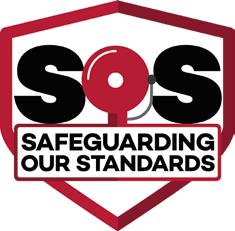
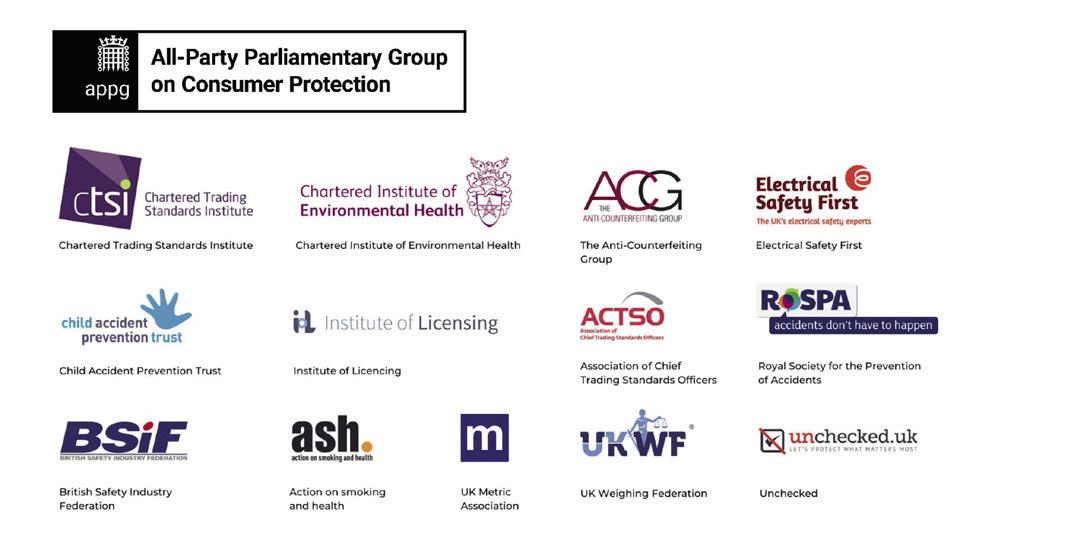
Safeguarding Our Standards comprises a coalition of organisations and individuals with an interest in maintaining the protections that the people of the United Kingdom have benefited from for years. Rushing through legislation which could undermine these protections would have potentially disastrous consequences, and could ultimately put lives at risk. Consumer protections underpin so many aspects of our society and economy including food safety, product safety, animal welfare and consumer rights. These protections are there to protect us all – and can help to contain outbreaks of disease in animal livestock; prevent people from being ripped off by rogue traders, scammers and illegal money lenders; and ultimately help to maintain consumer confidence in businesses and the quality and fair pricing of the goods we all buy.
Many of the pieces of legislation upon which Trading Standards Officers rely every day – as well as other crucial legislation that protects the environment, the rights of workers and public health – will be directly affected by the proposed Bill. Under the Government’s proposed timetable, thousands of pieces of complex and vitally important legislation will need to be reviewed, rewritten –and, potentially, scrapped – in a little over a year. Mistakes, omissions and contradictions are inevitable.
It was previously estimated that some 2,400 separate pieces of legislation would be affected by the Bill. It has since emerged that a further 1,400 laws will fall within its purview. The haste with which the Bill was seemingly conceived, as well as the speed by which it will need to be finalised if it is to meet its proposed deadline of 31 December 2023, raises very serious concerns. Even with a possible extension to 2026, this doesn’t give a huge amount of time for scrutiny, particularly with a General Election which will also have an impact on the Parliamentary timetable afforded to consider the legislation.
As the country wrestles with a cost-of-living crisis which every day brings increasing levels of consumer harm,



rushing to scrap the very laws which serve as a bulwark against the rising tide of threats seems at best short-sighted and, at worst, recklessly irresponsible.
We are writing to express our deep concerns that in its current form, the Retained EU Law Bill could cause serious harm to the people, businesses, environment and economy of the UK. We are calling on the Government to amend its timetable for the implementation of the Retained EU Law Bill, and suggest a phased timetable with targets for specific areas of legislation.
We would also call on the Government to give a cast-iron guarantee that UK consumers will be no worse off if the Bill is introduced, with the highest standards for food, the safety of the products we use and the protections that safeguard so many of us being maintained.
We recognise the opportunities that reviewing legislation can bring and we appreciate that there are areas where divergence from EU law could benefit the UK. There is certainly potential to modernise and improve several aspects of consumer protection law. However, undertaking such a massive project, particularly during such a turbulent period, will require an appropriate amount of time and deliberation –otherwise it may end up doing more harm than good.
16 | Winter 2023
Dear Prime Minister,
Yours sincerely, John Herriman
CTSI Chief Executive
Including CTSI Vice Presidents: Baroness Christine Crawley, Alma Williams, Richard Thomas CBE, Paul Allen, Ron Gainsford and Robert Wright.
WINTER 2023 Journal of Trading Standards
Matt Allwright
Outsourcing accountability
By shifting shopping habits away from the high street, online retail has undermined consumers’ rights to redress when things go wrong
A recent stroll through the relatively affluent town where I was born gave me lots of opportunity to reflect. I don’t mean that I moped about as if I was in a French art film, pondering my existence. I mean that I was confronted by one empty shop window after another, with nothing to look at except my mirror image. Not a pretty picture.

The demise of our town centres isn’t news – it’s been happening for decades, as the combination punches of out-of-town and e-commerce have it all but sprawling on the canvas, gumshield out. What worries me now is how the loss of bricks-and-mortar shopfronts seems to be resulting in a chipping away at the enforceable rights which protect us all.
You buy a jacket on an online marketplace which connects buyers and sellers. After a week, both the sleeves fall off. Face to face, you’d be able to claim under the CRA 2015. Buying direct online would give you a fortnight. The returns policy of the website, however, only gives you five days. Your money’s gone, but worse; you now own a jerkin.
your request to speak to a human. No email, no phone line. You give up and write off the money and the product.
The laws haven’t changed, but our ability to make those laws work for us has been diminished because of intermediaries, buck-passing or timewasting

You buy a washing machine online which you use responsibly. It fails just outside warranty, so you go back to the retailer. They redirect you to the manufacturer to decide whether the failure is due to your actions. The manufacturer decides the machine has no fault, and offers you nothing. Despite the CRA saying the retailer should be dealing with this, they wash their hands of you.
You buy a patio table online. It arrives without one leg. You contact the retailer but end up in an exchange with a chatbot, which takes you round in circles and ignores
All of these are similar to scenarios I’ve witnessed recently. The laws haven’t changed, but our ability to make those laws work for us has been diminished because of intermediaries, buck-passing or timewasting. Of course, the shopfront was never perfect. We’ve all come across assistants who didn’t understand the product or consumer law, or didn’t have the authority to take action. But it offered a shared space with a degree of consistency. During opening hours, there was a place where you could go to meet with the same actual human beings, with name badges, faces and careers, who knew that a failure to help a customer may result in an escalating problem. That’s a compelling reason to get it right first time.
Laws are only as good as our ability to enact them. It feels right now that our power to insist on our legal rights is being steadily undercut by a number of workaround structures which favour the retailer or marketplace. They represent a real threat to consumer confidence, and that’s not something that as a country, we should be hanging in our shop window. ●
MATT ALLWRIGHT | 17
Winter 2023
Matt is a journalist and presenter of the BBC’s Watchdog and RogueTraders
ALL CHANGE ON THE HIGH STREET

18 | Winter 2023
Cover Story By Helen Nugent
FROM ILLICIT VAPES TO RIP-OFF CANDY STORES, THE
UK’S
HIGH STREETS
HAVE BECOME A BATTLEGROUND
FOR TRADING STANDARDS. WITH COST-OF-LIVING WOES PILING PRESSURE ON LEGITIMATE BUSINESSES AND CONSUMERS, HOW CAN TRADING STANDARDS KEEP THE AMASSING THREATS AT BAY?
The high street’s flagging fortunes have been well documented in recent years, fuelled by various financial crises, the rise in popularity of online shopping, and the allure of out-of-town retail centres. But recent statistics point to even more fundamental changes as a result of the pandemic and the worsening cost-of-living crisis.
According to research compiled for PwC by the Local Data Company, almost 9,000 chain stores disappeared from Britain’s retail map in the first six months of 2021. The 2022 figure is likely to make for even more depressing reading.


Meanwhile, a permanent change in the nation’s working and shopping habits, as well as new approaches to selling from both legitimate and illegitimate sellers, is likely to continue to pose challenges for Trading Standards – and we haven’t even mentioned the effect of Brexit and ongoing Government negotiations with the European Union.
So, what kind of issues are Trading Standards services facing on an irrevocably altered high street? A recent CTSI survey asked members ‘Considering the changing face of the high street in recent times, which of the following are causing your local Trading Standards service the most concern?’ With corner shops, general food stores, second-hand
shops and fast-food takeaways all making it into the top five, none could beat vape shops as the most problematic, with 61% of the vote.
David MacKenzie, Chair of the Society of Chief Officers of Trading Standards in Scotland (SCOTSS), is all too familiar with the challenges posed by vaping outlets and their products.
“These single-use vapes in particular are very cheap, they look a bit like highlighter pens, they have bright colours, and they are attractive to children,” he says. “What particularly concerned us, and caught us unawares a bit, is that they are particularly attractive to young children. With a lot of our age-restricted product work on tobacco and cigarettes, fireworks and traditional vapes, we’re looking at sales to 16 and 17-year-olds. But we were getting good information that these were being sold to much younger children, or certainly finding their way into the hands of 12and 13-year-olds.
“They are not meant for children and they are not meant to be a leisure product, and the long-term effects are unknown but suspected to be not entirely positive. Why does a smoking cessation device have to be these bright colours? There’s no reason for that at all. They’re clearly designed to sell to young people.”
www.JournalofTradingStandards.co.uk | 19
Journal of Trading Standards
As in other parts of the UK, vapes are everywhere, making it difficult to effectively regulate their sale and use. Then there are the attendant issues surrounding them, including their impact on the environment because they are not easy to dispose of, and many are simply discarded with no thought of recycling.
“So for all sorts of reasons, even with all the other pressures that are on us at the moment, this became quite a high priority,” says MacKenzie. “We’ve done a lot of work on this, we’ve done test purchases, we’ve issued fixed penalties, and we’ve seized a lot of these products. The other thing is that some of them have got too much nicotine in them so they’re dangerous for anyone to use.”
Tourist traps
Like MacKenzie in Scotland, Lee Older, a Senior Practitioner at Westminster City Council’s Trading Standards service, is aware of a lot of disposable vapes which are very popular with young people and often contain illegal amounts of nicotine.
He says: “The legal limit is 2% but, in London, Trading Standards are seeing anything up to 6% as well
as vapes containing well over the permitted amount of liquid. This can have health and safety issues if the device fails and leaks, as nicotine is a highly poisonous substance.”
Since November 2021, Older says that Westminster Trading Standards has seized around 24,000 vapes, mostly from outlets on Oxford Street, the main shopping thoroughfare in the capital, and also a problem area for so-called ‘American candy stores’.


Older explains: “We’ve always had a problem with the souvenir-style shops tending to sell counterfeit goods like mobile phone electrical items. Since the decline of the high street and with COVID, we’ve now seen these candy stores also opening up. The candy stores go handin-hand with the souvenir shops. We’re finding the directors of the souvenir shops are also the directors of the candy stores. In fact, most of the candy stores will have concessions based within them that are still selling your souvenir-type items with those counterfeit and product safety issues.”
Spurious candy stores bring their own unique challenges, particularly in terms
of pricing. Failure to display prices is common practice and American-style candy is likely to cost significantly more than traditional UK sweets. Of course, this is something that unscrupulous sellers take advantage of, among other even more nefarious practices. These include adding zeros at the till, resulting in a candy bar thought to cost £10 costing the consumer £100, who only realises what has happened once they check their bank statement.
Bogus products are also prevalent. “We have found counterfeit Willy Wonka chocolate bars,” says Older. “We believe these are supermarket-own brand cheap chocolate with counterfeit wrapping on them which are then sold for £15 to £20 per bar. There is some danger associated with that if they fail to list the allergens that might be present in the bar itself. Nuts are probably the most common ingredient you’re going to find in these chocolate bars and, if you’re highly sensitive to them, this can result in death in the worst of cases.”
As with the vaping stores, prosecutions can be tricky, not least because of the behaviour of the shop owners.
20 | Winter 2023
Cover Story By Helen Nugent
THESE SINGLE-USE VAPES IN PARTICULAR ARE VERY CHEAP, THEY LOOK A BIT LIKE HIGHLIGHTER PENS, THEY HAVE BRIGHT COLOURS, AND THEY ARE ATTRACTIVE TO CHILDREN
be that we can establish or show to the court that, over a certain period of time, despite all of our efforts, these premises are constantly being used to sell illicit goods. That is something we’ll be looking to deploy going forward.”
Falling dominos
Closure orders are also being considered – and implemented – in Wales as a method of clamping down on rogue traders.
Judith Parry is Chair of Trading Standards Wales. She agrees that, over the past few years, the high street has changed dramatically, saying that when you lose the key players, “it’s almost like a
“What we find in talking to the landlords of these premises, there’s a lot of subletting that goes on, not just on Oxford Street but over our entire borough. In a lot of situations, I don’t think that the owner of the property actually knows who is in their premises and, presumably, doesn’t really care. If those premises lie vacant, after a certain period of time, the property owner becomes liable for the business rates. And so a lot of them don’t mind having any old trader within the premises, even if that trader isn’t passing on any rental pay.”
Despite the obstacles, a lot of work is being done to tackle the issues in Westminster. “The work we are doing on Oxford Street is a council-wide project, it’s not just Trading Standards,” says Older. “There’s a team within the council that is looking to find short-term lets for traders that they have vetted and are going to trade legitimately.
I DON’T THINK THAT THE OWNER OF THE PROPERTY ACTUALLY KNOWS WHO IS IN THEIR PREMISES AND, PRESUMABLY, DOESN’T REALLY CARE
61%
of TS services say illicit vape sales are causing the most concern 9,000
store closures in first half of 2021 600,000%
the interest charged on loans by some illegal moneylenders
They’ll incentivise that with discounts in business rates.
“But we’ve lost some big names on Oxford Street. We lost HMV, we lost Next, we lost Debenhams. These are all big premises and, unfortunately, they’ve all been taken over by these souvenir and candy stores. And when you go into these premises, you’re not necessarily dealing with one business. For some of them, it’s like walking into a market where they are all concessions.”
He continues: “We’re looking at closure orders going forward. Closure orders aren’t something we’ve done in the past in Westminster. The idea would
domino effect that everyone goes from the high street”.
In areas in Wales where businesses have pulled out from the high street leaving numerous vacant premises, landlords with bills to pay are keen to fill those empty outlets. The result can be pop-up shops, but not in the traditional sense.

“We had some appear about 18 months ago and officers came back to me and said, there’s something not right there because they don’t seem to have enough stock in them to be able to trade,” says Parry. “They said, you’ve got cornflakes on the shelf or toilet rolls on the shelf, but

www.JournalofTradingStandards.co.uk | 21
Journal of Trading Standards
they’re only one row deep. So, it looks like a full shelf, but they’re only one deep all the way across, and they can’t be making money.”
After speaking to neighbouring Welsh authorities, Parry and her colleagues found that this was being replicated across Wales, and across the M4 corridor predominantly. Since then, they’ve discovered that many of these premises are fronts for illegal tobacco.

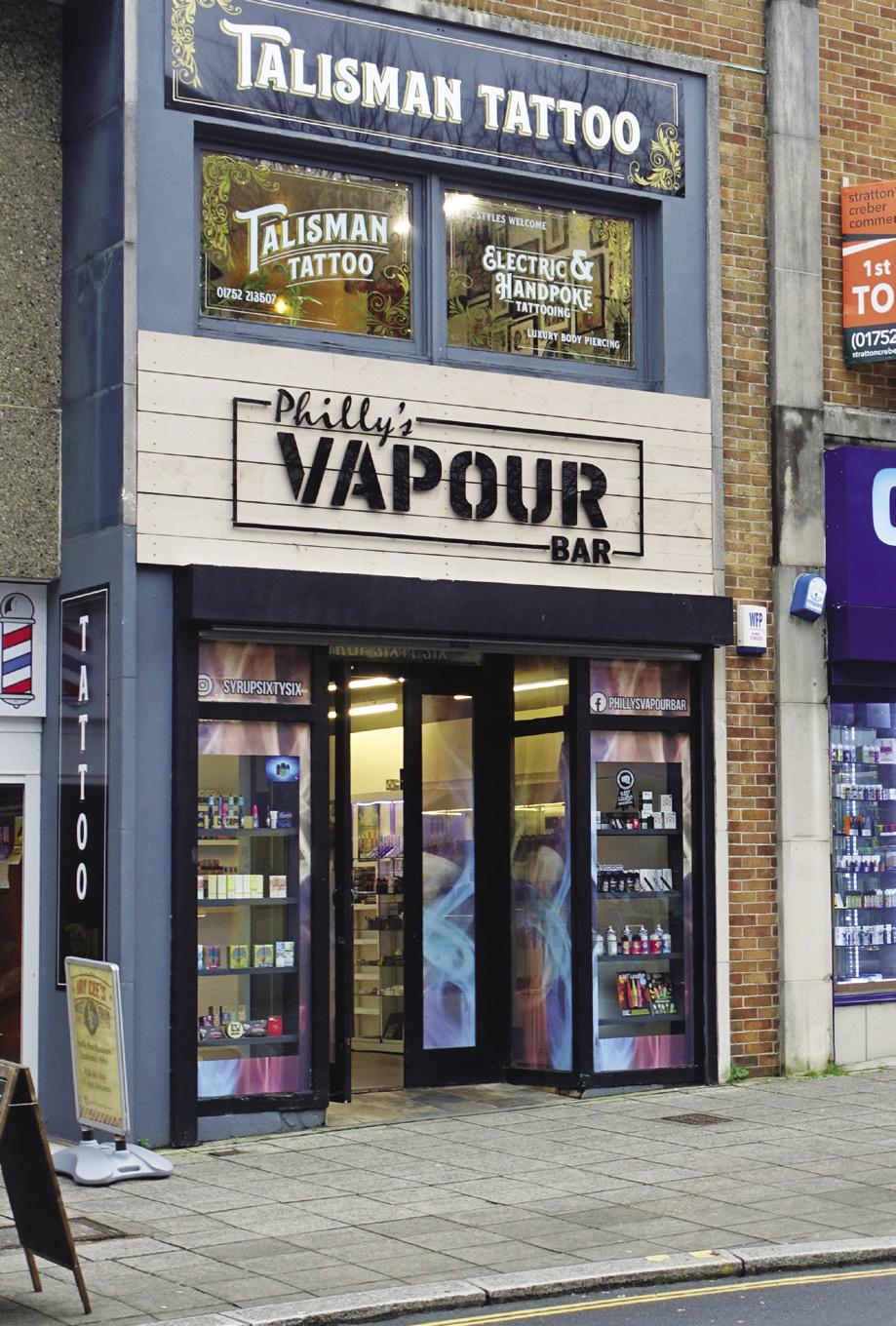
“Some areas have instigated closure orders, which are being adopted by other Trading Standards officers in Wales. This follows attempts to liaise with landlords and warn them that they could be aiding and abetting illegal activities, but many landlords didn’t evict the tenants and, at times, it proved difficult to track down the landlords.”
Work is also being done in Wales to help people who are thinking about setting up their own legitimate businesses, as well as those who have already done so, particularly during COVID. The scheme helps to get them into empty premises on the high street if that’s suitable for their business model.
“It’s looking at it from a local authority point of view as well as a Trading Standards point of view in that, if those high streets
are supported with genuine traders, they bring in other genuine traders, they reinvigorate the high street,” says Parry.
Sharks circling
Also in Wales, as in the rest of the UK, the changing high street has had a profound effect on the availability of legitimate credit. Elizabeth Emmons is Client Liaison Officer at Stop Loan Sharks Wales (stoploansharkswales.co.uk).
“People use the expression ‘loan sharks’ when what they actually mean is extortionate sub-prime, as we used to call it. That would have been payday lenders and some doorstep lenders,” she says.
“We need to make sure that people understand that they may find some sources of credit to be extortionate and possibly immoral but, if they’re legal, they’re outside our remit.”
While Emmons and the rest of the team support caps on extortionate interest rates –which have been imposed in recent years by financial
regulators and the government – they are aware that if people can’t borrow from the likes of the now defunct Wonga or traditional lenders typically found on the high street, they may resort to loan sharks.
“People will always need credit,” she says. “If their credit rating is shot and they used to be able to go to these pretty shocking and extortionate high street legal lenders, they may find that those firms are going out of business. So where are those people going? The more you regulate the legal sector, the more people are probably going to go underground.”
She continues: The point about the unregulated, illegal sector, which is where we work, is that there are no rules. So you can’t negotiate.
“Generally, the loan sharks are a last resort and they’re going to become a last resort for more people because legitimate sub-prime lending has been so regulated. And then if you add to that COVID, the cost-of-living crisis, and everything else, somebody who needs £25 for school shoes for the kids, where are they going to go?”
While the interest rates levied by these shady lenders vary dramatically, they are almost always incredibly high. Trading Standards has to calculate the APR for prosecution purposes and,
22 | Winter 2023
Story By
Cover
Helen Nugent
IF THOSE HIGH STREETS ARE SUPPORTED WITH GENUINE TRADERS, THEY BRING IN OTHER GENUINE TRADERS, THEY REINVIGORATE THE HIGH STREET
according to Emmons, they come in at figures like 600,000%.
In addition, prosecuting loan sharks is incredibly resource-intensive, and the victims of this kind of crime are usually frightened of engaging with authority. They often think that they’ve done something illegal or are too frightened to say anything, and are gripped by shame, fear and embarrassment.
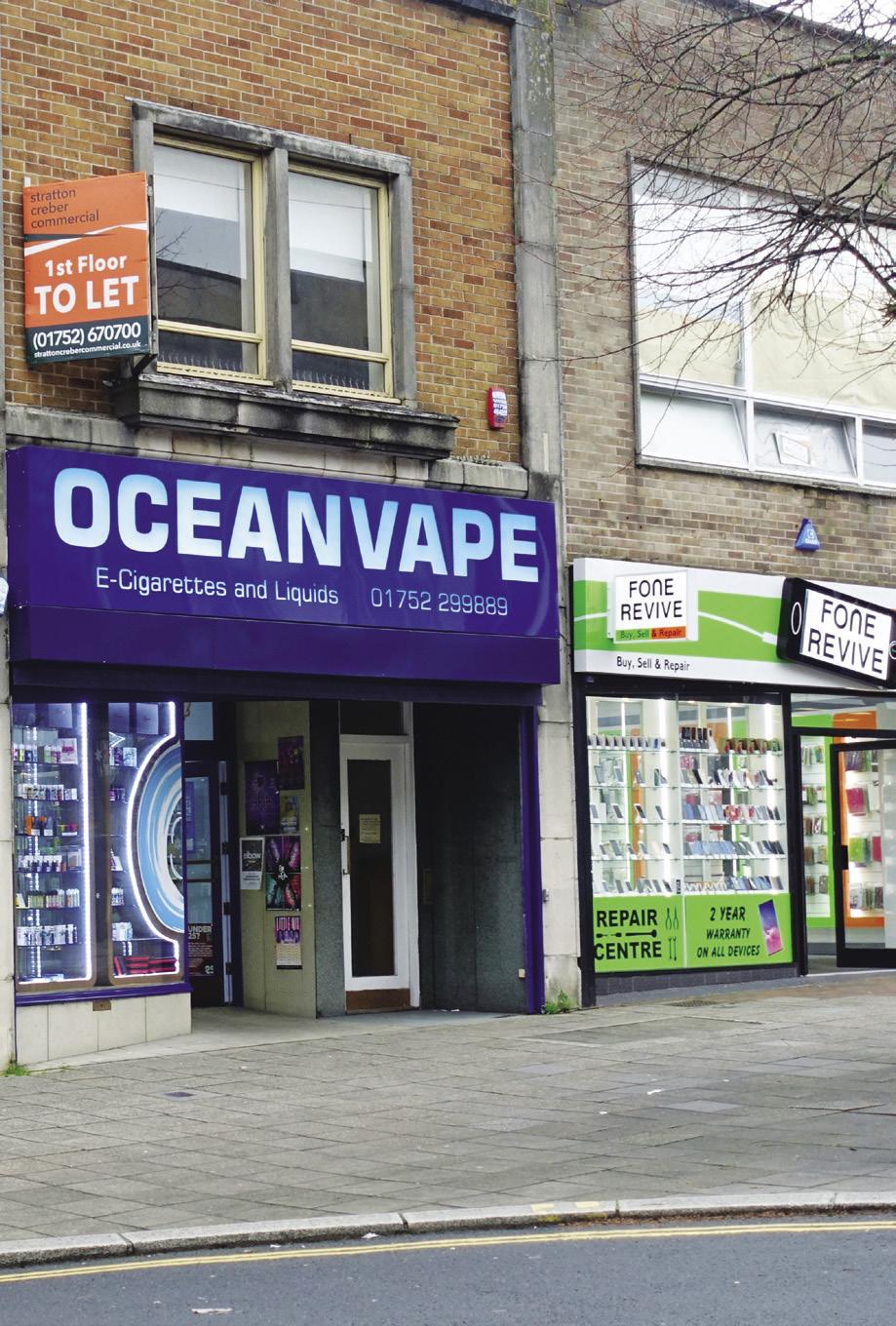
As a result, Trading Standards services mostly learn of these issues via an agency like Citizens Advice. All told, it’s an incredibly complicated process.
However, in the 14 years that Emmons has been with her unit, every loan shark prosecuted (excepting one) has pleaded guilty. “If we get enough information from an advice agency and hopefully from talking to victims, then we can ask the magistrates for a search warrant. And once we’re in, we find that we can take their mobiles and laptops straightaway.”
No short measures
Back in Scotland, the cost-of-living crisis is making itself felt in yet another way. MacKenzie says that Trading Standards is seeing an increase in complaints about basic things, including prices of goods in supermarkets. A recent Scottish

GENERALLY, THE LOAN SHARKS ARE A LAST RESORT AND THEY’RE GOING TO BECOME A LAST RESORT FOR MORE PEOPLE BECAUSE LEGITIMATE SUBPRIME LENDING HAS BEEN SO REGULATED
investigation found that short-weight products may be contributing to the cost-of-living crisis.
“We’re doing a project in Scotland where we’re checking prices in bigger shops and also in smaller shops,” MacKenzie says. “We’re checking that a price is being displayed at all. In normal times, that’s something we don’t like [if there isn’t a visible price] but it’s not going to be top of our list of priorities. But it matters to people at the moment.
“A related thing is some short measures. Colleagues in the West of Scotland did a project on this and found a fair bit wrong.”
The retail monitoring project sought to protect consumers from detriment when finances are stretched and prices are rising due to inflation. During the investigation, in which weight checks were carried out on packaged goods at 39 retail outlets, the majority of packs did
not give cause for concern. However, 15 packers were found to have placed noncompliant goods on the market.
Once the findings were made public, they attracted a lot of attention.
MacKenzie says: “I was really struck by the level of interest that the media had on that. It really brought it home to me that these are really basic fundamental things that people might think are a thing of the past. But these are absolutely brass tacks things that are important at the moment; they matter in a crisis.
“Measurement is at the heart of fair trade in goods and is a core issue for Trading Standards teams across Scotland, making sure that consumers get what they pay for and that businesses are weighing and measuring goods accurately. Against the backdrop of the current cost-of-living crisis, it is even more important that the processes and systems that should be in place are working properly, and consumers get what they pay for.”
MacKenzie believes that as the crisis worsens and people’s finances are squeezed even more, concerns over correct measurements will become more important. Combined with other emerging threats, surely that makes the work of Trading Standards more vital than ever. l
www.JournalofTradingStandards.co.uk | 23
Journal of Trading Standards
Vape shops 1 Corner shops 2 General food stores/small supermarkets 3 Second hand stores 4 Fast food takeaways 5 Pop up shops (i.e. latest crazes) 6 Candy stores 7 Discount stores 8 Souvenir shops 9 Payday loan shops 10 0 500 1,000 1,500 2,000 2,500 3,000 3,500
Considering the changing face of our high street in recent times, which of the following are causing your local trading standards the most concern? Please rate with the most problematic at the top, and the least at the bottom
CTSI
Source:
John Herriman Chief Executive, CTSI
A time of crisis –and opportunity

One thing is for certain: we are living in unprecedented times. Amidst the disruption and instability though, there are reasons to be optimistic

I was reflecting the other day on just how much has happened in the first three years of this decade that have not only had a profound impact nationally but internationally as well. It started with the pandemic, then Brexit, then the cost-of-living crisis, which was then made worse by the tragic war in Ukraine as well as by the self-inflicted pain of the Government’s mini-budget with its ensuing market turmoil.
Against this backdrop we also see a drive for regulatory reform, and it is undoubtedly important to ensure legislation keeps pace with the rapidly changing world. But there is also a huge risk that proposals like the Retained EU Law Bill will result in important protections for consumers and businesses being lost (see p16).
All of those events and policies have long-term social, economic and legislative consequences which will be pervasive – and we really are seeing a winter of discontent as the public mood responds. Alongside all of this we also had the death of Her Majesty the Queen,
a national and international figurehead whose passing marked the end of not just a reign, but an era as well.
Dramatic changes
The result of all of this change over a very short period is that the established macro and micro world order is being challenged and is adjusting out of necessity.
We have seen incredibly dramatic changes in both business and consumer behaviours, especially in relation to online marketplaces. Consumers are being exposed to new risks on an almost daily basis and we are constantly seeing reports in the press about new scams or ways in which people are being exposed to increasing threats. Data from Citizens Advice highlights increasing levels of consumer detriment and similar data from the CBI shows falling levels of business confidence. At a time when everyone agrees it is only an economic recovery that can fundamentally improve outcomes for consumers and businesses, the prospect of that sometimes feels like a long way off.
Consumers sit at the heart of our work and our social purpose as a profession. One thing I am very aware of through previous work in the charity sector is that those who were most vulnerable during the pandemic will be exactly the same individuals and groups who are most at risk during the cost-of-living crisis. The most marginalised groups in society were impacted then and they will be again now, including many ethnically diverse communities.
It’s therefore incredible to see the way the profession responds to these challenges and there is no better example of that than the Hajj Project in The London Borough of Barking and Dagenham, which recently won the 2022 Institute’s Hero Award (see p54).
24 | Winter 2023
THINK PIECE
Line of defence
Our role as a profession during this costof-living crisis, and against a backdrop of change, has therefore never been more important. Members of our profession are working tirelessly on the front line in local government Trading Standards services, in devolved nation Trading Standards structures, in the civil service, in businesses and in not-for-profit organisations. The way I like to view this is as a form of layered defence and support system, protecting consumers and aiding businesses, where the profession becomes more than the sum of its parts through collaboration and partnership.
I have, however, sensed that over a period of years there has been, for a whole
We have an opportunity right now, during very worrying times for consumers and businesses, to show just how much of an impact our profession has in making a positive difference


variety of reasons ranging from legislative changes through to budget cuts, a gradual fragmentation of the profession. It is this fragmentation that ‘CTSI’s Vision and Strategy – helping to build a fairer world for consumers and businesses’ directly addresses by showing how the profession can directly help during the current challenging circumstances.
We know how important our work is to the economic recovery, and how protecting consumers directly affects consumer and business confidence. Our new vision shows our increased relevance during a period when the world order is changing, and our challenge now is to keep increasing the profession’s collective profile, showing the critical nature of our activities and working in partnership with high-profile regulatory enforcement bodies like the CMA. We deserve the same level of recognition, and that’s what we are striving for.
We have an opportunity right now, during very worrying times for consumers and businesses, to show just how much of an impact our profession has in making a positive difference through all of our combined efforts. We know that Government is looking for solutions and we have many of them, and are indeed proactively forging ahead on many fronts as we see increasing levels of consumers detriment and business risk.
In a crisis we are proving to be exactly what the country and the public needs – and there is so much evidence that not only are we responding at a time of turbulence, but we are also adapting to the new world order and the key role we can play in it. l
Journal of Trading Standards www.JournalofTradingStandards.co.uk | 25
The power of trust
To improve outcomes for consumers, businesses and society in general, the theoretical underpinnings of much of our regulation are due for a rethink, believes Professor Chris Hodges

Professor Chris Hodges is perhaps the UK’s foremost authority on regulation –and, specifically, on making regulation better. Through his work at the Centre for Socio-Legal Studies at the University of Oxford, his chairmanship of the Regulatory Horizons Council and his many books – including, most recently, Outcome-Based Cooperation In Communities, Business, Regulation, and Dispute Resolution, he examines how potentially abstract concepts can be applied to real-life scenarios through an understanding of human behaviour.
“The Centre for Socio-Legal Studies is a part of the law faculty, but it is multidisciplinary,” Hodges explains. “We were set up 50 years ago in order to examine how law works in society. There are lawyers, sociologists, legal anthropologists, economists and various other types of academic looking at a huge array of situations where people are
involved with society’s rules or state rules, and how those systems work.
“As a lawyer, I’ve been focusing on psychology for several years, but you’ve also got to know about economic theory and legal philosophy in order to understand more about what works and why – and how we can improve it.”
Hodges’ recent work examines the role cooperation has to play in creating good regulation. “The idea of looking at cooperation came out of my reading and thinking about how humans have changed the institutions within which they cooperate over millennia, almost since homo sapiens started,” he says.
The principle of cooperation is built on trust, Hodges points out. “If you trust one another, then you can cooperate well – it’s very simple. Of course, when you start looking at real life as it exists, you see impediments; we could misevaluate the evidence if we haven’t got enough of
it. Trust involves a mental attitude, and we can be wrong. But actually, values of fairness are consistent. Most humans have got a complete set of values, unless you’re a psychopath. But we emphasise some values in some situations more than others. For example, people who feel under threat emphasise defensive and aggressive tendencies, whereas people who feel confident are much more benign and altruistic, and therefore cooperate more.”
A more refined understanding of cooperation and its benefits raises the potentially awkward fact that the often punitive approach of conventional regulation is at odds with hardwired human behaviour. “There is a great deal of evidence of how regulators and enforcers work in different sectors, and what works and what doesn’t work,” says Hodges. “A lot of it is in silos, but if you are able to see the overview, it builds up to a very significant and consistent picture. The difficult point
26 | Winter 2023
By Richard Young
Research
Professor Chris Hodges speaking at the 2022 CTSI Conference
is that this challenges traditional ideas of how we regulate and, in particular, how we enforce.”
Taking flight Hodges cites the aviation sector as an example of how cooperation can underpin more effective regulation. “The aviation sector adopts what it calls ‘performancebased regulation’, in which they almost remove blame in order to get everyone to cooperate. Planes stay in the sky, and we all have confidence and trust when getting on a plane that we will get off at the other end. It’s quite remarkable when you consider the technical complexities and the number of people involved.
“It boils down to what they call an open and just culture. In an open culture, they share all information all the time on the basis of trust; and in a just culture there are always consequences when a problem is identified.
“But it’s not necessarily what we would call enforcement traditionally; in fact, the CAA very rarely uses fines, and only occasionally removes a license. It’s a different approach. They changed the language, and changed the mood in order to achieve this stunning outcome. But, importantly, they don’t have to deal with many criminals.”
Hodges contrasts the cooperative model of the aviation industry with the carrot-and-stick approach of the financial sector. “Many big financial companies have historically set targets for individuals and sack the bottom 10% of performers,” he says. “It turns out that the performance of that bottom 10% is actually totally accidental and arbitrary. The punitive culture doesn’t build confidence and intrinsic motivation.”
If such practices persist, Hodges says, “crises are going to continue happening in the financial system. One of the things that got me interested in this was looking into a lot of literature on the cause of the global financial crisis in 2008. It isn’t just me; every governmental body, from the Basel Financial Stability Board down, started talking about culture. But culture
is a very slippery concept; how do we measure culture? What is it?
“You’ve got to have an ethical culture, ultimately. There are plenty of cultures that exist which are not ethical – for example, China or Russia or any dictatorship; they work to some extent, but are they stable and sustainable? Are they producing good outcomes?”
Cultural shift
Collaboration is essential to creating systems of regulation that benefit society, Hodges believes – and strengthening cooperation between Trading Standards and businesses is an important part of this. “The key point here, conceptually, is that the legal model of regulation through making rules, inspecting and identifying breaches, imposing sanctions, and assuming that sanctions will deter and achieve compliance, is usually not particularly reliable,” he says.
“Of course, you need to make rules and you need to inspect and identify breaches, but maybe one can do that better with a collaborative approach.
“There need to be consequences for bad behaviours. But is that best done through sanctions in the traditional enforcement approach? Well, of course it is if you’re protecting society from criminals, but if one’s dealing with businesses where one needs to improve their performance, then different approaches work. It becomes more complex and needs more tools in the box.”
One of those tools, Hodges says, is what he calls ‘outcome-based cooperative regulation’. “The simple idea behind
outcome-based cooperative regulation is that we need to work out what it is we’re trying to do. In other words, agree all the purposes and the outcomes. Are we producing harm, or are we producing good? Usually regulators and enforcers measure outputs. In other words, numbers of inspections, guidance, documents, produced fines, imposed prosecutions, etc. Those aren’t outcomes.
“As one American Chief of Police said, you can have millions of fines, but does that make the streets safe? We must also produce evidence of trustworthiness which is assessed against our inherent understanding of what is right and wrong. So let’s work on this and produce more evidence that we can be trusted.”
Trading Standards, with its responsibility for enforcing more than 250 laws and encouraging compliance across a wide range of sectors and activities, is in many ways a somewhat more complex proposition even than keeping planes in the sky. Surely that creates particular obstacles to cooperation?
“Yes, some situations are easier than others, some sectors are easier,” Hodges concedes. “Trading Standards, in my view, is critical and essentially important. But there is a sort of schizophrenia; there has been a change from a perception of Trading Standards as being just about enforcement to a perception of it as a means of support in many cases. The idea that it is only about law enforcement, I think is a really limiting approach. It’s a highly professional job which needs lots of skill, and it produces some fantastic outcomes.
“Sometimes you don’t need to ‘regulate’ in a culture of openness and growth. A lot of the concepts and a lot of the ways we work, are changing quite considerably. It’s immensely exciting because it improves how we operate, and improves the outcomes that we get as regulators or enforcers in terms of helping businesses do better. And of course, that’s what we need as a country just at the moment.” l
www.JournalofTradingStandards.co.uk | 27
Journal of Trading Standards
“The difficult point is that this challenges traditional ideas of how we regulate and, in particular, how we enforce”
Duncan Stephenson Policy and External Affairs Director, CTSI
Forthcoming attractions
Over the coming months and years, CTSI will be taking a more visible, more proactive stance on a range of issues, guided by the concerns and passions of our members
Since joining CTSI in spring 2022 I have been overwhelmed by the sheer variety, complexity and abundance of issues that Trading Standards is involved with. And Trading Standards is not just some kind of passive bystander on these issues, but very much an active participant in making things happen. My main tasks for the year ahead are to build the voice of what our profession and Institute does, communicate the impact of our work and to lobby and influence for change. In order to achieve this we have to determine an initial set of policy priorities that can underpin our proactive campaign work.
Spreading the word
The good news, from a communications perspective at least, is that Trading Standards has an embarrassment of riches when it comes to the issues we have a stake in. Many of these are part of the zeitgeist and therefore of interest to the media, to consumers and high up the political radar. Cost of living, Net Zero, levelling up, the digital economy, EU Law Reform – all of these are areas with which our profession is involved and where we have the credibility and legitimacy for our voice to be heard.
The bad news is that there are simply so many different issues that CTSI could proactively speak about that unless
we prioritise, we will be in danger of appearing scattergun in our approach and flitting from issue to issue, without really getting to grips with the substance of anything. In order for CTSI and the Trading Standards profession to cut through, we are going to have to focus, initially at least, on a few key areas.

Top priorities
It will be impossible to satisfy everyone, as each of our 2,000 members have their own particular passions and opinions. Right now, CTSI doesn’t have any priorities for proactive policy and campaign work, so this will hopefully be a step forward. To help inform what those priorities should be, we recently conducted a fairly extensive membership survey. This is one of the tools that has helped us determine what the areas of focus are going to be.
A big caveat to this is that these are the views of a fairly small proportion of our current members. It is important that CTSI better understands more fully how to engage those who haven’t responded and who aren’t members, to ensure we start offering what many in the profession want. The responses were also very heavily tilted towards Local Authority Trading Standards services, and we are keen to get the views of people who work
in other settings as well in the future –including businesses.
It was clear from our survey that there were some common themes and key areas that members want CTSI to have a more proactive voice on. The main areas included product safety; the cost of living; scams and doorstep crime; online marketplaces; and legal metrology.
In terms of emerging issues there were clear concerns around vaping – not just non-compliant products on the marketplace, but also the illegal sale and supply of vapes to young people. There were also significant comments about our work in relation to food standards and the importance of supporting animal welfare.
Focus for 2023
While we can’t do everything immediately, we will be working across several key areas in the months ahead. This will include forming small advisory groups from our membership and with input from external stakeholders on issues that we will be taking forward, and we will be in touch via our Head Office Update to keep you involved and updated.
Firstly, we will be looking at online marketplaces and what more can be done to mitigate risks to consumers. These include a lack of consumer protections when buying from third-party sellers,
28 | Winter 2023
THINK PIECE
vapes
concerns about the safety of goods, and issues around counterfeiting. There are a number of forthcoming developments including the draft Competitions and Markets Bill, the OPSS Product Safety Review and the Online Safety Bill. The UK is also at risk of potentially falling behind the EU, which has a Digital Services Act which takes effect in spring 2023 and provides a new regulatory regime for digital gatekeepers.
around vaping and e-cigarettes. While acknowledging the importance of these products as smoking cessation tools, there are a number of issues CTSI will seek to take forward. Data from the MHRA suggests the number of new product notifications has grown exponentially in the past couple of years and as many as 3 million vapes are binned every week!
Data from local Trading Standards teams also shows a significant increase in the reporting of underage vape sales between 2021 and 2022. While absolute numbers remain low, May 2021 and July 2022 intelligence logs increased by 1,958% and complaints reported to Trading Standards services via Citizens Advice increased by 1,367%.
Net Zero commitments, with a particular focus on society’s most vulnerable. If The Decent Homes Standard and the Net Zero commitments are to become a reality, significant remedial work will need to be undertaken on homes across the UK. This would mean a commitment to install around 600,000 heat pumps a year by 2028. With a shortage of good contractors and construction products these initiatives may be blighted with a surge in rogue traders and doorstep crime.
It was clear from our survey that there were some common themes and key areas that members want CTSI to have a more proactive voice on
The changing nature of our food supply chain will be the focus of another key project, which will cover food standards and animal welfare issues. Recent shocks to our supply chain from Brexit, COVID and the war in Ukraine have had a significant impact, leading to shortages and potential risks from poor quality, adulterated and illegal substitutes entering the market. We will be setting out the standards expected in food production and the need for proper levels of enforcement across all elements of the supply chain. Another area CTSI will be seeking to provide some policy leadership in relates to the growing concerns
The cost-of-living crisis is putting pressure on consumers to save money wherever possible. Consumers are buying second-hand goods rather than new to save money, along with ordering through online marketplaces, and this can present issues with products not meeting the necessary safety requirements. CTSI will examine changes to consumer buying habits due to the cost-of-living crisis and will be undertaking a placebased educational campaign to monitor attitudes towards product safety.
We will also be exploring the impact of housing reform and the Government’s
We will be examining some of the current workforce challenges around legal metrology, including staffing and inspection levels and also looking ahead at future innovations in legal metrology, and how vitally important this work is in underpinning consumer confidence in business and wider society.
Finally we will continue to take forward our Safeguarding Our Standards campaign, in collaboration with our coalition partners, to call for a rethink of the Retained EU Law Bill.
The policy priorities mapped out above are just the start – and we hope to explore other areas that emerge as opportunities arise. With the support and regular engagement of our members I am sure that we can start punching above our weight and finally get the recognition that our profession deserves. ●
Journal of Trading Standards www.JournalofTradingStandards.co.uk | 29
protection goods officers
issue always businesses
food
ts
people cost sales online need
far
safety living profession staff
deregulation standards
government use scams energy
crisis effect agenda due consumer health
consumers support
nicotine moment issues services illicit
service products across etc area work
lack animal
measures legislation product ctsi
Straight talker
Lord Michael Bichard, Chair of National Trading Standards, discusses why there is a greater need for consumer protection than ever – and why cuts to Trading Standards resources put lives at risk

Lord Michael Bichard has held many high-profile roles at local and national level, including running councils, government departments and universities. Now, as Chair of National Trading Standards (NTS), he is fighting to make the profession’s voice heard, and his message is stark: cuts to Trading Standards services could cost lives.
Speaking via Zoom, Bichard begins by describing some of the challenges the profession faces. “This is a pivotal moment for consumers, and Trading Standards has got a really big part to play in dealing with the problems that are coming down the track,” he says. “Think about cost of living – think about energy prices, think about inflation. The public need Trading Standards – they may not realise it – probably more than ever before.”
Bichard began his career as a solicitor in local government, an experience which
he believes gave him an insight into the practicalities of enforcement. “I was a fairly aggressive prosecuting solicitor and I think the Trading Standards inspectors quite liked that,” he says. “If you spend a lot of time putting a case together, the last thing you want is to hand it over to some solicitor who’s a bit soft.”
He brings that no-nonsense attitude to the NTS role, and he doesn’t mince his words. “I’m very concerned about how some people are going to get through the winter. Many of them are already in poverty.” In such a climate, Bichard points out, the illusion of a bargain can be very tempting. “Older people in particular can be very vulnerable to someone coming along and saying, ‘I’ll fix that roof for you’ or, ‘I happen to be in the area. I’ve got some tarmac, would you like me to do your drive while I’m here?’
“They can also be vulnerable to special offers on food,” he observes, and
30 | Winter 2023
Lord Michael Bichard By Richard Young
highlights a recent case in which a doorto-door trader sold rotten fish to elderly people. The aggressive tactics employed by Brian Pendlington in County Durham caused 28 victims to lose more than £6,000 between them. Many of his victims lived alone and some were suffering from serious health conditions. The subsequent prosecution, brought by NTS, resulted in an eight-month jail sentence.
“In the situation we’re in at the moment, there will be lots of that kind of person, and we’ve got to do our best to stop them,” Bichard says.
New technology and consumer habits also present new challenges, he points out. “Scams now often operate through digital technology; I don’t want to stereotype here, but some older people find it quite difficult to understand all of that. It can be difficult for anyone to spot, for example, some of the sophisticated scams that we’re now seeing. That’s why at this moment in time, we’ve got to step up to the plate.”
Laying it on the line
In part because of its broad remit –and in even larger part because of the drastic cuts to resources over the past decade – the voice of Trading Standards has become somewhat muted, its core message diluted. There is a need to rethink what that message is, and to turn up the volume, Bichard believes. “I’m trying to get Trading Standards talking not so much about the legislation that
they enforce, but to be saying through the media, ‘this is what we’re doing to help people not to be ripped off; what we’re doing is saving people from bad services.’
“People are interested in the outcome, that we’re protecting them at a time when they need protecting more than ever before. That’s why the Government should be very careful about cutting the resources available to Trading Standards.
“People sometimes also forget that the other arm of Trading Standards is protecting legitimate businesses, which have been through a hell of a couple of years and a lot of them are on the edge. The last thing they need is some ripoff merchant coming along and taking their business away from them. We’re protecting the consumer, but we’re also protecting business. And that’s why we need to be protected ourselves, and resources need to be fed towards
Trading Standards, not taken away.”

Recent economic instability has raised the spectre of further cuts to public services. Bichard, as a cross-bench peer with no particular political agenda, believes Trading Standards must take a pragmatic approach. “If you want to persuade a minister or a government, you persuade them by showing how it’s going to damage them politically and affect their constituents,” he says. “We haven’t done enough of that. We’ve now got to focus on the outcomes, the people, and the harm that criminals are doing.
“Local authorities have been absolutely brilliant over the last 20 years, and have dealt with massive cuts. They’ve had to reprioritise what they do and they’ve done far more than central government departments, in my view, to deal with the reduction in resources. To be looking for further cuts would be catastrophic.

www.JournalofTradingStandards.co.uk | 31
“
Journal of Trading Standards
If you don’t fund us what’s going to happen? People are going to suffer, people are going to die, actually ”
The cruel illicit puppy trade is a particular concern
“But we’ve got to make our case, and it has got to be about people, not about standards and legislation. We have a government after all, which has made it pretty clear that it’s more about deregulation and getting rid of what it sees as bureaucracy than it is about enforcing standards to protect people. We can’t just say, ‘but we’re the people who enforce these standards and these regulations’ – we’ve got to go beyond that and say, ‘if you don’t fund us what’s going to happen? People are going to suffer, people are going to die, actually, if you’re not careful.’”
A problem shared
In 2004, Bichard spearheaded an inquiry into the circumstances surrounding the murders of schoolgirls Holly Wells and Jessica Chapman in Soham two years previously. One of the key findings of the Bichard Inquiry was that the sharing of intelligence between different agencies could make it more difficult for such a thing to happen again.
Prior to this interview, I had been speaking with Alison Farrar, CTSI Lead Officer for Property and Lettings and Consumer Education, who mentioned that she refers to the Bichard Inquiry during training sessions. “As Local Authority officers, we see things when we visit people’s homes that cause us alarm or make us wonder what’s going on,” she said. “We see locked doors, beds in sheds, violent and coercive behaviour, poor living standards, overcrowding, illegal evictions, harassment of tenants, and a whole list of things that just don’t add up. We need to share this intelligence because someone else might be able to use it as part of their investigation. It might be the missing piece of the jigsaw that helps them pull a case together.”
In light of this, I ask Bichard for his view on how Trading Standards Officers can benefit from intelligence-sharing in their everyday work. “I think she
makes a really important point,” he says. “Intelligence is more easily shared now than probably ever before and, if you’re spotting things that worry you – and, the Data Protection Act permitting – you should put that on a database, so it’s there for someone else to pick up.
“One of the things that Soham showed was that it’s a pattern of behaviour in an individual that tells you a great deal about them. Ian Huntley had only ever been convicted of one thing previously, and that was a burglary. But if you had all of his records in front of you, you would have seen a pattern of behaviour, which would lead you to be suspicious about this guy. And that only came out right at the end, at the trial.
“If you’re a chief executive of a large organisation such as a local authority, you’ve got to get people on the front line to share their information and their knowledge. Too often, people at the top of organisations think they know everything,
whereas actually, most of the intelligence and the ideas and the knowledge is right on the front line.
“I would encourage Trading Standards services to look around to partners who can support what they’re doing. One of the things the pandemic showed us is that – sadly, from my point of view –people trust charities and voluntary sector organisations more than they do statutory sector agencies. It also shows that those organisations are often quicker and more agile in spotting problems. The statutory sector needs to tap in and work with charities and the voluntary sector better than it has in the past.”
Joining the dots
A variety of senior roles across a diverse range of fields make Bichard well placed to see the connections between what would at first glance appear to be disparate things, but whose relevance to Trading Standards soon becomes clear.
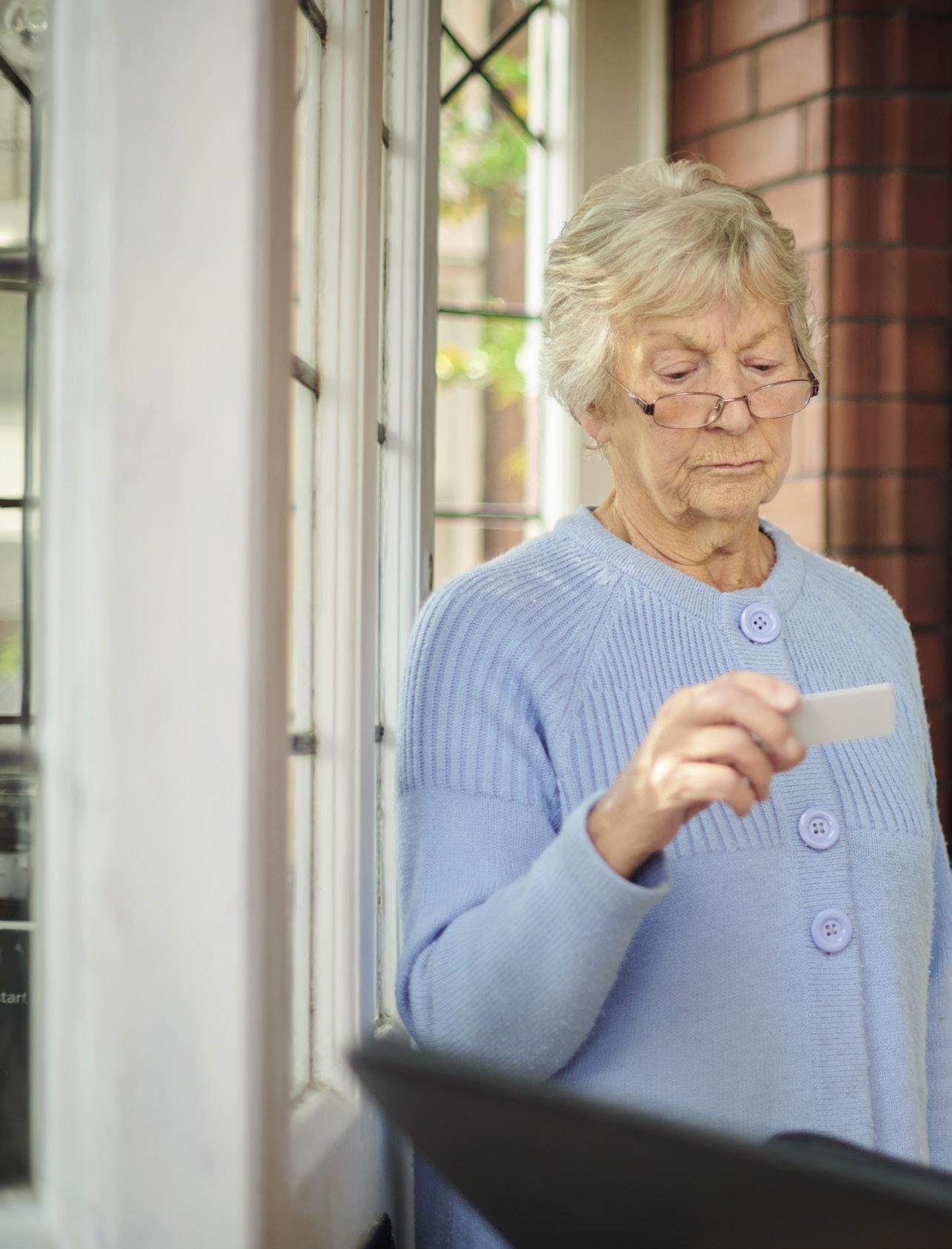
32 | Winter 2023
Lord Michael Bichard By Richard Young
People at the top of organisations think they know everything, whereas most of the knowledge is right on the front line
For example, he has served as Chair of the Design Council and describes his tenure there, and as Rector of The University of the Arts London, as an opportunity to “meet some amazingly creative people”.
“You talk to fashion designers about rip-offs and fakes, and it cripples them. It’s a shocking thing to do to someone’s intellectual property. In this country, we have a very laissez faire approach to fake goods; there’s a sort of Only Fools and Horses thing, of saying ‘oh, well, these rogues, what fun they are…’ Actually, they’re probably selling you something that’s worth nothing. They may well also be selling you something that’s really dangerous, that hasn’t been tested and could cause a fire in your property, could cause skin damage, or hurt your children.
“People have to understand why fakes and counterfeiting is not on, particularly at the moment. We can’t have people spending hard-earned money on things that are worth nothing at all.”
If the public fully understood what we are doing, I think they would have more respect and understanding
The ‘lovable rogue’ character of the popular imagination masks a darker reality, Bichard points out. “A lot of storage facilities around the country are being used to store these counterfeit articles. What they’re actually doing is feeding criminal gangs. Organised crime is very quick to spot an opportunity and the money they get, they will use for other purposes.
“I was in Newport recently looking at illegal puppy breeding, which is horrible. Criminals are always quick to spot an opportunity. At the beginning of the pandemic, a lot of people were buying dogs. Now, because of the cost-ofliving crisis, many of those dogs are going to be dumped.
“I also used to run the benefits agency; I know about fraud, and there’s a lot of it. Whenever you have a government grant scheme, people will try and find loopholes. Trading Standards needs to be one step ahead of all of that.

“We are dealing with big crime here, and people need to understand that better as well. It’s another reason why we shouldn’t be having money taken away.
“I don’t much like bureaucracy – I don’t like process unless it’s absolutely necessary. I think it gets in the way of outcomes. But there are basic standards you’ve got to respect and enforce. And that’s really what we’re about; we’re enforcing things that need to be dealt with – rotten foods, scamming pensioners, fraud, killing dogs and puppies. These are not marginal issues.
“If the public fully understood what we are doing, I think they would have more respect and understanding. They’d be more likely to support us if they saw some of the stuff that I saw on the puppy farms in South Wales. They’d be absolutely horrified.”
Bichard also has first-hand experience of how it feels to fall victim to the criminals that Trading Standards is fighting against. “I was scammed about four or five years ago, and I felt incredibly stupid,” he says. “It was quite a sophisticated scam, and it cost me quite a lot of money. I felt demoralised and depressed afterwards. If I’d been older and more frail, I think it would have had quite an impact upon my wellbeing and my mental health.
“That’s what we’ve got to focus on at the moment. People have not got any money. A lot of elderly people live on their own and can be very vulnerable. If something like this happens, they feel not just more vulnerable, they feel scared and they feel depressed. And it’s a downward cycle when you get into that situation. There is research that shows that once that’s happened to you, you’re more likely to die earlier than if it hadn’t.
“So it doesn’t matter whether it’s food, or scams, or product safety, or puppies, or counterfeit clothing or whatever: without Trading Standards, our society would be a lot more vulnerable.” ●

www.JournalofTradingStandards.co.uk | 33
Journal of Trading Standards
Rogue traders scamming the elderly are also in Bichard’s sights
Many happy returns
As the UK International Consumer Centre (UKICC) marks its 15th anniversary, Susan Tolman reflects on the vital role the service has played – and continues to play – in empowering consumers buying products from overseas
Since its inception, the UKICC has helped UK consumers with problems arising from online shopping, internet auctions, holidays, timeshares, holiday clubs and air travel. But the everyday requests for help are peppered with a range of more unusual, and in some cases, quite bizarre cases.

In the past 15 years, we have handled cases involving a ‘rank-smelling’ lipstick which was supplied free with a magazine; a £3,000 horse bought from Sweden which was suffering from such severe medical conditions that it couldn’t be ridden; a ghost-hunting device that didn’t work; a hair transplant operation which didn’t produce the hair regrowth the consumer hoped for; a masturbation aid bought online from a trader in the Netherlands (which the consumer said
wasn’t what he wanted); and ‘human fingers’ found in dog food bought from a German trader online.
In the past year alone, we have helped a woman who adopted a street dog from a charity in the Balkans which had to be put down because its condition was so bad; a man who was unhappy with the results of a cosmetic procedure on his nose; and a bride and groom who were left in the cold on their wedding day by an ice cream seller.
The service provided by the UKICC is free and we usually get involved when consumers have exhausted their own efforts to resolve a dispute directly with the trader. This may take the form of providing information and advice on an aspect of consumer law, pointing them to the correct website
resources, or referring them to another specialised organisation.
We provide tailored advice to help the consumer resolve their complaint and often we involve one of our ever-growing partnership consumer organisations around the world and ask them to contact the trader on behalf of UK consumers.
The only thing that has really changed for UK consumers since the UK left the EU is that we are now able to help them with disputes over purchases made in an increasing number of non-European countries. Since Brexit, our service has been funded by the Department for Business, Energy and Industrial Strategy (BEIS) and is delivered by CTSI.
According to UKICC Service Director, Andy Allen: “These relationships aim to support the resolution of disputes between UK consumers and traders based abroad, resulting in more confident and empowered consumers who are making use of global markets.
“The UKICC plays a critical role in the UK consumer protection landscape. As we celebrate our 15th anniversary,
34 | Winter 2023
Cross-border justice By Susan Tolman
we sincerely hope that the future is one in which our valuable UKICC service is retained.”
Impact on consumer policies
Back in 2007, it would have been difficult to foresee the range of impacts that the UKICC would have on consumer policies over the next 15 years.
Not only has our team of advisors responded to more than 160,000 problems raised by UK customers, but we have also made significant contributions to improving consumer laws governing disputes. We have done this through consultation papers, workshops and projects or campaigns nationally and internationally, as well as working with consumer organisations in the EU and elsewhere to streamline the process by which consumers can gain redress.
Laws which have been improved with our input include the streamlining of the online distance-selling laws; broadening of timeshare legislation to close loopholes; the expansion of the sale of goods and
As we celebrate our 15th anniversary, we sincerely hope that the future is one in which our valuable UKICC service is retained
services-related legislation to include statutory rights for digital content and enhanced enforcement powers.
“For 15 years, we have helped many thousands of consumers and hope we are able to continue assisting them for many years to come,” says Allen. “We plan to build on what we’ve achieved so far and evolve our service for the future. In a world where there is lots of uncertainty, UK consumers know that they can rely on the UKICC to be there for them.
“Our aim is to help as many UK consumers to achieve a positive result as possible: a refund, replacement, repair, or cancellation of their contract.” ●

For further information, visit www.ukecc.net

Journal of Trading Standards For further information contact college@tsi.org.uk Over 70 years of support to CTSI and the profession Registered charity No 213351 Over 70 years of support to CTSI and the profession Support Achievement Valuable Award Profession Students Scholarships Funding Programme Research The College door is always open contact us at: college@tsi.org.uk www.tradingstandards.uk The registered charity of CTSI We rely on your support by way of donations to enable these initiatives We are extending our funding to those wishing to apply for grants in support of: • encouraging recruitment into the profession • trainee and officer competency and personal development • helping the profession to deliver positive outcomes which show its relevance to corporate agendas and central government policy
Recruitment drive
For some of us, finding ourselves back at our old schools is the stuff of anxietyinducing bad dreams; for Ellis Donaldson, returning to the classroom gave her a chance to spread the word about Trading Standards to a new generation – and to impress upon them what a rewarding career working in consumer protection and enforcement can be.

Earlier this year, Donaldson was approached by her alma mater, the Ellen Wilkinson School for Girls in Ealing, to give a presentation on her experiences, first as a Regulatory Compliance Officer Apprentice and then as a Trading Standards Officer at Ealing Borough Council. “I bumped into one of my old PE teachers and told her about what I’m doing now,” she says. “The following Monday I got an email from the school careers advisor saying that they’d love me to come in and talk to the students. I was really honoured that they wanted me to come back.”
Since leaving school, Donaldson has been busy – and, as she points out, she has come a long way in just five years. “I started at the council at 17 as an apprentice. I then completed my level three in Business Administration before choosing to move into Trading Standards, as the team did something I was really interested in and wanted to learn more about.
“Trading Standards is not a profession that is particularly advertised or marketed in any sort of way. But when I first got to experience what the team do, I saw the importance of it, and how things like unsafe goods, unsafe cosmetics and illicit tobacco and alcohol have such an impact on our society.
“When I first joined the team, I was the youngest person in Ealing Trading Standards by 22 years, and I was also the only female at the time,” she adds. When Kiran Seyan joined the team as its new Manager, Donaldson says, “I was really glad because it made such a difference; it’s nice to have a mixture of ages and a female boss – something I’d not had before.”
Learning on the job
Donaldson’s time as an apprentice gave her practical experience of Trading Standards work and an opportunity to learn from colleagues. “For my first two years in Trading Standards I was a technical assistant,” she says. “I would learn from my team, shadow the officers, assist them with their prosecutions in exhibiting evidence or sending it away for further analysis. Those sorts of things taught me the bread and butter of Trading Standards in terms of putting together a prosecution.
“I have got three successful prosecutions under my belt so far. One of them was for misdescribed scarves. My colleague and I bought a variety of scarves that claimed to be 100% cashmere. We sent them away for testing, and they came back as polyester, acrylic and nylon, all synthetic man-made materials. I submitted my prosecution, having put all the evidence together, and it resulted in a guilty verdict and quite a hefty fine. The work pays off in the end, and that is what makes it all worth it.”
So what sort of reception did Donaldson get from the pupils she spoke
to? Were there any aspects of Trading Standards that particularly captured their attention? “Some thought that we are more of a regulatory service – they think we monitor hygiene and keep people safe in terms of health and safety. They didn’t really get what we do at all,” says Donaldson. “So it was good being able to actually explain what we do, and they were quite engaged during my presentation.
“They were keen to ask about who regulated companies like Amazon and eBay; they found that really interesting, and they wanted to know who holds these
36 | Winter 2023
As one of Trading Standards’ younger Officers, Ellis Donaldson has a unique perspective on what the profession can do to attract fresh talent – starting with going back to school
Apprenticeships By Richard Young
“When I showed them my warrant card, they were like, ‘Oh, so you’re a police officer? No way! That’s so cool!’”
large companies accountable. I went on to explain what a Primary Authority relationship is, and they thought it was crazy that you can have a Primary Authority working essentially for a company. But I explained to them that this is all in order to gain compliance, and how compliance is a fundamental part of Trading Standards.
“When I showed them my warrant card, they were like, ‘Oh, so you’re a police officer? No way! That’s so cool!’ I said, ‘No, no, no. But I probably have similar powers of entry to a police officer.’ And I gave them the example of going into my local newsagents and being able to search the shop behind the till or in the stockroom. They were really engaged, they thought it was really interesting.”
Without wishing to over-generalise, it seems that many young people’s interests and priorities – around things like social justice and environmental causes – align

quite well with a lot of Trading Standards work. I ask Donaldson whether that rings true in her experience. “I definitely would say that it does,” she observes.
“The younger generation, myself included, are very aware of global warming and the climate crisis. At Ealing our values include accountability, and we try and be very green as a council. We work with businesses to gain compliance with the solid fuel regulations and legislation that was recently changed with regards to pollutants.
“Another important topic is the Black Lives Matter movement; Ealing have started doing open surveys for residents to try and engage with them and find out what they need in relation to equality, diversity and inclusion. My mum is half-Pakistani, half-English, and so I’ve grown up in a very mixed-culture family. Seeing the equality and diversity that is being pushed throughout Ealing, and
throughout London, I think is absolutely amazing. At last year’s Conference, I was very happy to see that Trading Standards is actually very diverse –perhaps not so much in age, but at least in terms of such a broad range of people from all walks of life.
“When it comes to engaging with the community, we need to appreciate cultural differences. With things like skin lightening creams, or chewing tobacco, or all of those types of things that are so ingrained in a culture, it becomes difficult if you go out and say, you can’t sell this, or you can’t do this. It’s more about education. Once people are informed, they are then able to say, ‘Oh, no, you were right, we shouldn’t have this or we shouldn’t do this.’”
Spreading the word
If the values of Trading Standards align with those of so many young people, it seems surprising that the profession can struggle to attract new recruits. Donaldson believes the main barrier to entry is that many people simply are not aware of what the profession is actually for. “Honestly, I think not enough people know what we do,” she says. “That was the main point when I went to the school; none of them really understood our work. They got parts of it, but because we enforce over 250 pieces of legislation and cover such a wide variety of things, people don’t quite grasp what it is we do.
“We need to engage more with young people, speak to students at college, go into schools and get out there and advertise ourselves.

www.JournalofTradingStandards.co.uk | 37
“
Journal of Trading Standards
The issue isn’t that no one wants to do the job, the issue is that not enough people know and understand what we do.”
Ellis Donaldson gives a presentation to pupils at the Ellen Wilkinson School, Ealing
“I was very lucky to land myself in this team, but it was all by coincidence that I joined Regulatory Services and fell in love with Trading Standards; for other young people that want to go into Trading Standards there isn’t really a direct route though. If authorities are recruiting, they just want qualified officers.
“If authorities want fresh blood in their organisation they need to advertise apprenticeships and they need to be willing to teach the young people. I’m so lucky that I had such amazing officers to shadow; I was learning from the best.
“Just by getting the word out, people will be interested; the issue isn’t that no one wants to do the job, the issue is that not enough people know about and understand it.”
Being able to identify with the pupils she spoke to helped her make a more convincing case, Donaldson believes. “I would have found it helpful when I was in school to have a former student share their journey with us, to hear what can be accomplished without taking the conventional route of going to university, and learning about a profession that none of us knew existed. I think that
was probably the main takeaway for the students at the end of the day: that university is not their only option. And apprenticeships are an excellent way to get yourself into working life and earning.”
Donaldson is not the only one to sing the praise of apprenticeship schemes; National Trading Standards Chair Lord Michael Bichard (see p30) previously ran the Department for Education, which supported apprenticeships through initiatives such as the Learning and Skills Council. “I think apprenticeships are a really important route,” says Bichard. “We need to emphasise the fact that this is a way into a really good career and a really interesting job.
“I went into local government because I couldn’t afford to pay for my articles as a trainee lawyer. I landed on my
feet because I realised pretty quickly that working in local communities is absolutely fascinating. We’ve got to try and communicate that to younger people when they’re looking for a career, and then give them a route in which doesn’t involve them spending a hell of a lot of time at university. Don’t get me wrong – I’m a university chancellor – but not everyone wants to go that way.”
Tricks of the trade
When she visited her old school, Donaldson spoke to two groups of pupils, one from Year 12 and one from Year 10. “The year 12s had a much better basic level of understanding, whereas the year 10s would come back to me and ask, ‘What does compliance mean?’,” she says.

“When I first started, I would have been asking all of these questions, but in the blink of an eye five years have passed, and I am now a Trading Standards Officer. So I had to cover the basics for them – what our powers are, the types of enforcement that we do, what partner agencies we work with, and the work we do with sniffer dogs and the police.”
Finally, I ask Donaldson whether she has any advice for others in Trading Standards who might want to do something similar, either at their own old school or any other place of learning? “Writing my presentation from scratch I realised how complicated Trading Standards can be,” she says. “So keep it simple – don’t overload them with legislation or jargon. With any job, a lot of jargon comes with it, but if you start throwing it at people, they stop listening.
“I also tried to make it as interactive as possible – I brought in examples of counterfeit goods; and the more highclass the brands are, the more interested the students are going to be – Beats headphones, Apple accessories, designer bags, designer belts…
“One of the most engaging parts is including interesting cases,” she adds. “I told them about my prosecutions, I spoke about my achievements from when I was an apprentice. I think it’s important to talk about your journey and what makes you the Trading Standards Officer you are.” l
38 | Winter 2023
Apprenticeships By Richard Young
“With any job, a lot of jargon comes with it, but if you start throwing it at people, they stop listening”
Labour of love
Hallmarking has been enforced in Great Britain since the 14th century. CTSI Fellow Robert Grice has not been around for quite that long, although he is a longstanding stalwart of the Trading Standards profession. His work to raise the profile of hallmarking was instrumental in the founding of the Touchstone Awards, and he was recognised for his efforts with an MBE in the 2020 New Year’s Honours List.

Grice has written several books on Trading Standards topics, but his latest is in many ways the summation of a life’s work. “The book really came out of my entire professional career as a Trading Standards Officer for 50 years,” he explains. “I realised that hallmarking, although a fascinating subject, is something many people don’t know a great deal about. I wanted to write a book that would bring the subject to a wider audience.”
Touchstone, Trade and Transgression –A History of Hallmarking, Fraud in Silverware and Precious Metals is a significant contribution to the available literature on the subject, a carefully researched, lavishly illustrated book which reveals Grice’s passion on every page.

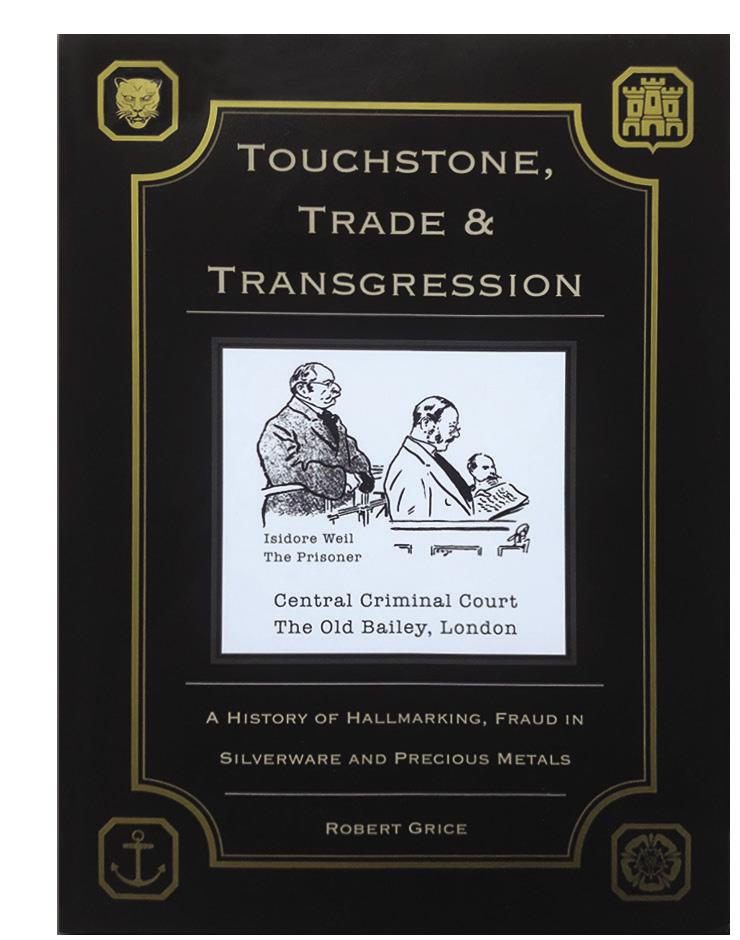
“Hallmarking is seen by many as a rather complex, dry subject – neither of which is the case, of course,” he says. “My objective was to write a book that was interesting, informative and enjoyable to read.
“It took four years to write and many more years in research. I tried to bring together a list of prosecution cases and enforcement action relating to the precious metal trade. These records are kept in the vaults of different institutions and no one, as far as I could discover, had ever tried to bring together a comprehensive list.
“I am very privileged in that I had
I am very privileged in that I had access to the libraries of each of the Assay Offices, which go back hundreds of years
access to the libraries of each of the Assay Offices, which go back hundreds of years. It was also a privilege to carry out research into Trading Standards records of enforcement action and newspaper archives. It was a long, slow, sometimes very difficult process – but extremely enjoyable as well.”
Those years spent in the vaults have culminated in a work that reveals some eternal truths about human behaviour. “I wanted to show that, as always in life,
the majority of people are good and lawabiding,” Grice says. “I felt that I needed to balance the list of transgressions with compliments to those who portray the honest aspects of trade. So there’s a section about traders who’ve tried to do that, hence the book’s title.
“A touchstone is an ancient method of determining the purity of precious metals; ‘trade’ brings into play those traders both good and bad; and ‘transgression’, of course, is about those people who are not so good.”
Charitable causes
As well as spreading knowledge, Grice wrote Touchstone, Trade and Transgression with the intention of helping people in a practical sense; copies are available through CTSI, with all proceeds going to the College of Fellows for its charitable activities. The book is also available through The Silversmiths and Jewellers Charity, with all proceeds likewise going to help those in need.
So what is the key message Grice has learned from all that sifting through the archives?
“The lessons of hallmarking apply right across society,” he says.
“It’s always better to include people when you want them to comply with the law. If you can do that, in many cases enforcement action is unnecessary. By gaining their agreement and discussing things, compliance comes about.
“There will always be a minority of people who, regardless of what you do, will not want to comply. In those cases you have to seek enforcement action. But if you explain what the law requires and how that’s good for business and consumers, it’s a win-win situation. That’s the message that comes down through the centuries.” ●
Robert Grice MBE is a familiar face to many in Trading Standards. His latest book on hallmarking takes a trip through time to examine a rich and fascinating subject that still resonates today
www.JournalofTradingStandards.co.uk | 39
Journal of Trading Standards Hallmarking By Richard Young
Image: Sheffi eld Assay Offi ce
Old problems, new solutions
As well as upholding the oldest form of consumer protection, the British Hallmarking Council champions innovative initiatives that promote enforcement

The UK hallmark is a simple but crucial device. A series of symbols, sometimes almost imperceptible and sometimes a key design feature, the hallmark is effectively a code. Interpretation of the mark tells us something of the item’s journey to market and, most importantly its precious metal content.
Frequently referred to as ‘the oldest form of consumer protection’, a hallmark is, more specifically, one of the earliest fair trading regulations. The system remains relevant, rigorous and vital. A hallmark guarantees that the precious metal alloy from which jewellery is crafted meets a specific standard and is therefore described correctly. The system has evolved significantly since its establishment in the 14th century, offering crucial protection to the jewellery trade and to consumers. As it nears its 700th anniversary our statutory independent third-party hallmarking regime is more important than ever.
Until around 2000 it was relatively straightforward for Trading Standards to enforce hallmarking. In an era with significantly more officers on the ground, TSOs regularly visited jewellers to check
for the mandatory signage, descriptions and physical hallmarks on goods.
Whilst this is still important, the advent of jewellery sales on the internet since 2000 has made hallmarking enforcement more difficult and resource-hungry. The combination of reduced Trading Standards funding, constantly rising precious metal prices and increased online access to the global market has significantly widened the opportunity for non-compliant and deliberately fraudulent traders to cheat consumers.
Market shifts
The jewellery market has experienced major changes since the financial crisis of 2008. As gold prices rose, gold jewellery became unaffordable to the mass market. Fine jewellers added more silver and costume jewellery to their ranges. New jewellery brands offered a mix of fine and fashion pieces. The status of the brand or the designer became more important than precious metal profile, and in a confusing market consumer understanding of the importance of the hallmark declined.
Meanwhile, diminishing Trading Standards resources were challenged
by an ever-increasing raft of Consumer Product Safety regulations, fraudulent online traders in every product category and counterfeit goods with potential to cause physical injury. Enforcement focus had to be prioritised and essential hallmarking investigations reluctantly pushed down the list.
Acknowledging the situation, the British Hallmarking Council (BHC) launched the Touchstone Award in 2012, to ensure that hallmarking enforcement remained on the agenda. It proved a timely intervention in a year when the gold price exceeded £1,000 per ounce for the first time. Gold bullion had hovered around £250 an ounce from 1980 to 2005. The consumer expectation of what they would pay for an item of ‘real’ gold jewellery was still based on this. The fourfold increase in price in just seven years caused mass-market jewellery providers to respond by offering gold-plated items with a silver or base metal interior. When described correctly and priced accordingly this was perfectly acceptable but the opportunity for the uninformed customer to be misled was suddenly greater than ever.
40 | Winter 2023
Hallmarking By Marion Wilson
A hallmark is one of the earliest fair trading regulations. The system remains relevant, rigorous and vital
The Touchstone Award celebrated its 10th Anniversary in 2022. Credit must go to Robert Grice MBE, who has championed this initiative to maintain the profile of hallmarking among enforcement officers (see page 39). Examination of many worthy applications confirms that hallmarking enforcement must not be neglected.
Cases range from individual goldsmiths taking in repairs that were never returned to the customer, to deliberately fraudulent sales of items which are not what they purport to be. Traders declare their innocence but their claims rarely bear scrutiny and there have been successful trials following prosecution under the Hallmarking Act. Amounts as high as £130,000 have been claimed back under the Proceeds of Crime Act. Associated offences under Weights and Measures, Trademark, Fraud and Unfair Trading regulations have also been uncovered.
A major case relating to the deliberate mass manufacture of 22ct gold bangles with a base metal core included Modern Slavery and Witness Intimidation within the offences. The personal emotional distress of the consumers cheated


when buying a special gift such as an engagement ring is immeasurable and must not be overlooked alongside the financial outcomes.
Online threats
Commending Trading Standards for these successful prosecutions, the BHC recognises there is much more to be done. The UK Hallmarking system is one of the most rigorous in the world and it is easy for businesses and consumers to take it for granted. The lack of control over major online marketplaces such as eBay and Amazon Marketplace is perceived as a threat to compliant jewellers, a view borne out by several Touchstone Application case studies. Significant consumer detriment due to online sales was recorded within many applications.
Finding misleading online sales, identifying the owner of the suspect website and pursuing them to prosecution is a lengthy and costly business. In extreme cases it is well worthwhile but it is acknowledged that only a tiny sample of the thousands of sites offering jewellery online can be scrutinised. Online sales rocketed during COVID lockdown, exacerbating the situation further.
The situation inspired a new approach from the BHC. Research commissioned from investigative specialists WRi Group demonstrated that reference to hallmarks was frequently omitted from items described as gold. Many items purporting to be 9ct were significantly under-priced if the descriptions were valid. Research by the National Association of Jewellers identified that only 63% of jewellerybuying consumers know what a hallmark is and the number is even lower amongst the under-55s. Consumer education with regard to hallmarks was clearly needed.
The response from the BHC has been emphatic. A digital version of the statutory Dealers Notice was created and circulated throughout the trade along with a short video. An initiative to encourage jewellers to link to hallmarking information throughout their websites was created and the Hallmarking Awareness and Learning Online (HALO) Award was launched in Summer 2021. Promotion of the Award
What a hallmark looks like
Who?
The registered mark of the company or individual who placed the items on the market.

What?
The precious metal content in parts per thousand inside a specific shape for each metal.


Where?
Each of the four UK Assay Offices has a separate mark.

International International hallmarks must contain the scales of the Common Control Mark.
via press releases, direct approaches from the Assay Offices and presence at trade conferences proved effective and an encouraging number of entries was received. These were considered by a judging panel including Kings Assay Master Graeme Smith, Sheffield Assay Master Ashley Carson and Chair of the BHC’s Education and Enforcement Committee Ken Daly of SCOTSS.
BHC Chair, Noel Hunter, said: “The Touchstone Award has been an asset to the enforcement of hallmarking for the past ten years and will continue to be so. Twinned with the HALO award, which the jewellery industry has responded to very positively, these two initiatives will serve to protect the online jewellery consumer more effectively. Hallmarking education and enforcement has never been more important and the BHC will continue to drive it throughout the next decade.” ●
Marion Wilson is a consultant to the British Hallmarking Council and the former Deputy Assay Master at the Birmingham Assay Office
www.JournalofTradingStandards.co.uk | 41
Journal of Trading Standards

42 |
BARONESS BEEBAN KIDRON

The filmmaker and children’s rights campaigner talks about the introduction of a new standard to bolster protections for children online, and discusses why legislators have a lot to learn from Trading Standards
BY RICHARD YOUNG
Baroness Beeban Kidron has spent her career exploring how film has the potential to improve children’s lives. As a director she has divided her time between London and Hollywood with films including Bridget Jones: The Edge of Reason (2004) and OrangesAre Not the Only Fruit (1989); these days, as a cross-party peer, much of her time is spent travelling between London and Washington, meeting with legislators and tech companies to encourage a more thoughtful, responsible approach to how children are treated in the digital space.
The FilmClub charity she co-founded, later renamed Into Film, uses film as a way of educating young people; now, with the 5Rights Foundation, she is campaigning for the introduction of new standards for age-appropriate digital services. Created in collaboration with the Institute of Electrical and Electronics Engineers (IEEE), the IEEE 2089-2021 Standard for Age Appropriate Digital Service introduces practical steps that companies can follow when designing digital products. It is based on five key principles: presenting information in an age-appropriate way; upholding children’s rights; offering fair terms for children; recognising childhood; and putting children ahead of commercial interests.
I meet Kidron in the cafeteria of the House of Lords, where she begins by explaining how her interest in children’s rights stems from her film work. “I always
went between making features and documentaries,” she says. “This came to a crossroads in 2012, when a smartphone became cheap enough for a parent to give it to their child. I noticed that all the kids around me suddenly changed and I thought, ‘that’s interesting’.”
Kidron’s documentary InRealLife (2013) examined how the lives of teenagers in the UK have been affected by the internet and, specifically, social media. “In the course of making the film, I realised that something enormous was happening that the world wasn’t watching,” she says. “I felt it was a generational injustice.
“I was struck by the fact that the kids went quiet. I always associate groups of young people as being both here, and somewhere else. And I wondered what that split might feel like in the long run. In the course of making the film, I looked at things about data, surveillance and profiling, and many of them are unfair commercial practices, in my view.
“It was absolutely extraordinary – the internet seemed to have some sort of exemption from the rules, including children’s rights, which are very well established and widely adhered to elsewhere. If you don’t have rights online, it follows that you don’t have rights at all.
“I didn’t realise at the time that I would start walking in a direction of legislation and policy, but that was the trigger.”
The pressure placed on children by social media – and the urgency of dealing with the problem – was brought into sharp focus recently by the death of British teenager Molly Russell. In a landmark verdict at the inquest in September, coroner Andrew Walker concluded that Molly “died from an act of self-harm while suffering from depression and the negative effects of online content”. Her father, Ian Russell, accused Facebook and Instagram owner Meta of “monetising misery”.
Bad behaviours
In 2019, Kidron chaired a UN committee that applied children’s digital rights to the Convention on the Rights of the Child. She was also behind a UK data protection law that “places responsibility on companies to provide well-designed services, rather than responsibility on parents and children to behave well, under circumstances in which they were being pushed to behave badly”.
Kidron is keen to stress that the fight for improved digital rights for children is not just about the content available to them; it is about a whole range of harmful and disruptive commercial practices.
“I am talking about direct messaging to kids; I’m talking about nudging kids to be awake through the night so they can’t wake up in the morning; I’m talking about keeping them in loops of anxiety about being popular, endlessly texting them,
IN CONVERSATION
In conversation: Baroness Beeban Kidron Journal of Trading Standards | 43
www.JournalofTradingStandards.co.uk
the social pressure to look like the most beautiful people in the world,” she says.
What has been the response from the tech industry itself to Kidron’s activities? “In the beginning, they were very dismissive,” she says. “I’ve certainly been the subject of ad hominem attacks and intensive lobbying by industry groups.
“However, I have always wanted to work with industry. My point has always been that government should not set the technical standard; they should set the principles by which they’re going to judge industry, and industry has the responsibility, skills and imaginations to innovate. In the places where we’ve passed the law, and they have innovated to meet that law, they have been remarkable and brilliant. We’ve seen really creative solutions.
“But there’s still too much drag, too much resistance. I’d like to see them hurtling forward, rather than resisting at all points. “I’ve also learned a great deal from them, in trying to understand what is difficult for them. Sometimes we can think of it in a more creative or pragmatic way without actually lessening the purpose. That’s a very important conversation to have as a policymaker.”
There is perhaps a common perception that ‘Silicon Valley culture’ is antipathetic towards regulation, favouring a more libertarian approach. Does that hold true, I wonder? “It’s definitely true historically, and it’s particularly visible in some of the household names and early adopters,” Kidron believes.
“Now though you have to be a bit more nuanced; there are hundreds of thousands of people working in this sector, many of them are parents, and many of them are worried or embarrassed, and don’t actually want to be part of an industry that is greedy and toxic. And many of them are talking to me, trying to build better products, trying to persuade people within their own companies that this is the right thing to do.
“Then there are corporate naysayers and a lot of people who are paid handsomely to make sure nothing good happens,” she adds. “It’s foolish to tar everyone with the same brush though –ultimately, we must judge the sector by what it actually does. If you can’t see the different shades of grey, maybe we miss an opportunity.”
Finding the floor
To ensure that children’s rights are built into the digital space from the ground up, Kidron believes it is necessary to establish a ‘floor’ – a benchmark for practices which becomes the industry standard. “We want to see that floor raised when it comes to behaviour,” she says.
“That goes across all of the technology and all of the companies.

“Children should be treated according to their rights and their development needs and, therefore, according to their age. What that really means is what we call the ‘four Cs’: content, contact, conduct, and commercial arrangements.
“When I started this, 75% of the social media companies enabled a stranger – an adult – to direct-message a child. That’s a contact issue. That’s a feature, it’s not a bug. It’s what they were trying to make happen, rather than preventing. If you ask any minister, any parent or indeed anyone in this room when is it a good idea to automate strange adults meeting underage children, you come up with only one answer.
“A floor never means you can’t do better. There is no ceiling to creating supportive, exciting, successful products that children use. We are very keen on default child-centred design, data protection and privacy, and taking a rights-based approach to create a broadly held understanding of what children deserve in the real world, and push that into the minds and practice of the sector.”
There are certain digital platforms or products, I suggest, that exploit children by design. How do they fit into the responsible culture the 5Rights Foundation is trying to promote?

“I do think that there are some companies whose sole purpose is either gathering data to sell on, or whose sole purpose is to sell children unnecessary assets

44 | In conversation with: Baroness Beeban Kidron Winter 2023
“There are corporate naysayers and a lot of people who are paid handsomely to make sure nothing good happens”
Kidron’s documentary InRealLife examined the effect of social media on children’s lives
that do not really add value to their lives,” Kidron says.
“However, some things are not necessarily bad for you in small quantities which might be bad for you in larger amounts. If I have an ice cream once a week, for example, that’s not really a problem. But some of these products are very intense, and they push kids into behaviours that are sort of endless.
“Whenever you’re dealing with a kid, you shouldn’t be selling them certain things; if you’re dealing with a kid who seems to have a credit card, you’d better check with the credit card holder; if you’re dealing with a kid and you’re just scraping their data, it’s not in their best interest.
“You start very, very quickly to say, actually, that particular service needs to redesign itself for the kid. It doesn’t mean it has to be totally different for all users. I want to emphasise that this should be proportionate and risk-based. I’m very careful about not demonising one product over another, but actually demanding a better experience for the user.”
In the same way that Kidron adopts a collaborative approach to working with industry, she is keen to avoid politicising her efforts. “This is a bipartisan issue,” she says. “I have never on my journey found that people divide on political, ideological grounds on this. The more people know, the more worried they are.
“My message to my colleagues and to other jurisdictions is, we have got to get it right. It mustn’t be allowed to become a battlefield. It is a responsibility in a world
that is so dominated by digital that kids get a fair shake. Don’t turn them into rats in the experiment.”



Raising standards
Its emphasis on fairness, protecting the vulnerable and encouraging good behaviour on the part of business places Kidron’s work squarely within Trading Standards’ general ethos. So what implications does it have for those working in consumer protection?
“If you think about Trading Standards as the ‘real-world’ version of what we’re seeking to do in the digital world, it’s an inspiration,” Kidron says.
“In the real world, Trading Standards sets a floor of behaviour for the community. If we have decided that children should not smoke cigarettes, Trading Standards then sets the bar by which you are judged to have achieved or not achieved that goal. The same applies to whether something is safe and fit for purpose, whether that is food or any other product.
“Essentially, we’re talking about product safety here. I think the biggest

obstacle to having in the digital world what most people would like to see, has been the industry’s claim of exceptionality. But actually, if you just look at it as a product, then the relevance of Trading Standards becomes obvious.
“I find the Trading Standards approach pragmatic, fair and successful. Proportionate regulation is what I believe in; I don’t think we have to make everybody on the planet a good person. I think we just have to take away bad actors.”
Finally, I ask what the role of parents is in all this. “You have to be careful, because you should never give people responsibility for things that they can’t really impact,” cautions Kidron. “If a parent goes to work, they come home and cook the dinner, they go to sleep; can they also be 24/7 on a kid’s phone? Secondarily, why should we make parents responsible for bad business practices?
“I think that the best way of looking at it, is that we have a vehicle at the top of the hill with no brake, no rearview mirror, and a kid at the wheel – and then we tell the parent to stand in front of that vehicle and make sure the kid’s all right. That’s not okay. And that’s not where we should put parents.” n
Further information
To find out more about the 5Rights Foundation and the IEEE 2089-2021 standard, visit 5rightsfoundation.com
| 45 Journal of Trading Standards
www.JournalofTradingStandards.co.uk
“It is a responsibility in a world that is so dominated by digital that kids get a fair shake. Don’t turn them into rats in the experiment”
A matter of life and death
The introduction of Natasha’s Law in October 2021 placed a requirement on businesses to declare a full list of ingredients on food that is pre-packaged for direct sale (PPDS) wherever it is sold.

The law came about as the result of campaigning by the parents of 15-year-old Natasha Ednan-Laperouse, who died in 2016 after suffering an allergic reaction to a sesame seed baguette purchased from a Pret-a-Manger at Heathrow Airport.
In theory, it means that consumers with allergies can be confident that they can buy takeaways, sandwiches and anything else that many of us take for granted, safe in the knowledge that any allergens have been clearly declared on the packaging. It places responsibility on businesses to be transparent about the ingredients of what they are selling, enabling consumers to make informed decisions.

In practice though, there remains confusion and a lack of understanding among many businesses about exactly what the law requires of them. According to David Pickering, CTSI Lead Officer for Food Standards, “The awareness of Natasha’s Law is really variable, because has an impact on smaller businesses that perhaps in the past haven’t really been too affected by food information requirements. These people are struggling to understand it.
“Local authorities are picking up on issues and trying to work with and support businesses, but it’s been very much dependent upon us coming across them through complaints. Generally speaking, where we can work with businesses we do, because we appreciate that they don’t necessarily understand what they’ve got to do.”
Pickering points out that among smaller businesses which – more than ever at the moment – are under pressure from rising costs and limited operating resources, there is often not a lot of time to keep up with changes to legislation –even when those changes could save lives.
“There are lots of allergen awareness resources out there, but it’s the reality of having the time and capacity to sit down and look at what they need to do,” he says. “If you run a small convenience store and you’re not a member of any trade association, and you sell sandwiches that are packed on the premises, then you’ve got to really think about what the ingredients are. And that can take time.
“Despite all the publicity and the issues that have happened, I think there are still quite a few businesses that aren’t really aware of it. It’s probably improved, but I think compliance is still very patchy.”
Raising the profile
One of the people who has worked hard to push home the point that allergen awareness is not something that can be ignored is Dilys Harris, Senior Trading Standards Officer at Caerphilly County Borough Council. She led an innovative project, supported by CTSI and the Greater Gwent Food Group, to produce allergen awareness resources, including posters, checklists and online videos, to spread the message that failing to declare allergens can cost lives.
In an effort to get through to as many businesses as possible, the resources come in a range of languages, including English, Welsh, Urdu, Punjabi, Bengali, Turkish, Kurdish, Cantonese and Mandarin.
46 | Winter 2023
More than one year on from the introduction of Natasha’s Law, and in the wake of several tragic deaths, have businesses got the message that pre-packaged food must declare allergens?
Allergens By Richard Young
“We’ve promoted it as far and wide as we possibly can,” says Harris – who won a CTSI Hero Award in 2021 in recognition of her efforts. “We’ve put it out on all of our press and professional platforms within my own authority. We’ve had a good response from businesses and have shared the links with some highrisk manufacturers, who are looking to incorporate it within their own systems and training, including during production stages on the factory floor.
“Environmental health colleagues are on board with it, too. And we have had very positive feedback from all sorts of professional colleagues, businesses and schools. We want to raise allergen awareness and we want to focus on education so that businesses get it right.”
Harris’s passion for the project came about in part after meeting the family of Megan Lee, a teenager who died after suffering a severe allergic reaction to nuts contained in a takeaway meal in 2016. Perhaps the most hard-hitting part of the campaign is a video portrait of Megan – a kind, fun-loving and popular girl whose life was cut tragically short.
Megan’s parents, Gemma and Adam Lee, say they got involved in the project because they wanted to bring forth something positive from their own personal tragedy. “It is the intention
and the vision to spread these resources nationwide,” says Gemma Lee. “As much as we would like to rewrite our story – we’d love to wake up tomorrow, and for it to be a dream – it’s reality, and we don’t want somebody else to go through this.”
The Megan Lee Award category will be introduced at the CTSI Hero Awards in 2023 to recognise work that raises the profile of allergen awareness.
Counting the cost
As well as the challenges of raising awareness of allergens there is a risk that, as businesses struggle with supply shortages and increasing costs, they may switch to an alternative ingredient without realising that it has a different allergen profile from what they used previously.
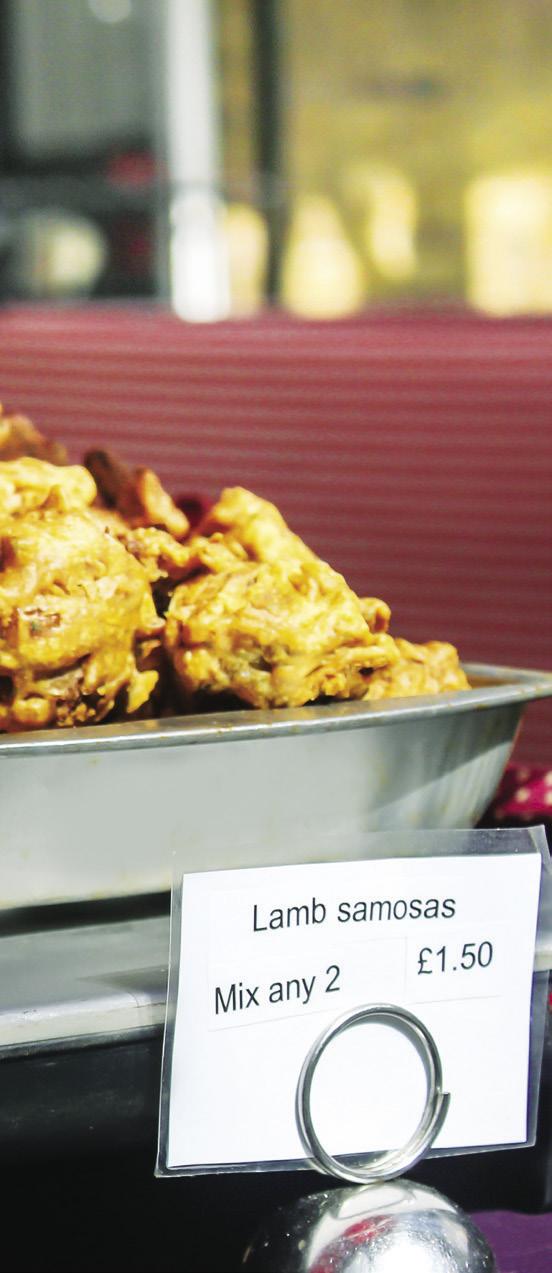


“It is an issue, because there may well be an assumption that it is the same product,” says Pickering. “But if it’s got a slightly different ingredient list, then that can be a problem. Again, it goes back to this idea of food businesses really understanding what they’re buying, and that the information should be available to them.
“It’s often in a last-minute shortage that businesses have to source something from a different supplier, or go out and buy something slightly different. On the face of it, they might think, for example,
‘Oh, it’s just mayonnaise, it’s fine’ – but that mayonnaise may well be made slightly differently from what they used before and have a different allergen profile.”
And, as ever in Trading Standards, a major problem is a shortage of available resources. As Pickering points out, “We can try and help those businesses, but there are resource pressures there too because we just don’t have the capacity to help all of the businesses that possibly need it. Unfortunately, problems often only come to light when we get a complaint or something goes wrong.”
As highlighted by the cases of Natasha, Megan and all too many others, the costs of something going wrong make this a particularly urgent issue, and one which no one can afford to take for granted. Do food businesses take it sufficiently seriously though?

“Across the food sector, there is a spectrum of understanding of food allergies,” says Pickering. “It can range from people thinking, ‘Well, it’s just fussy eaters’, through to people having an allergy themselves and really understanding the impact that this can have. Then there are some areas of this sector where there’s the belief that the consumer should protect themselves and they should be more responsible for their own allergy issue.
“There’s no uniform attitude towards this, and that’s the problem. We’re dealing with some businesses that haven’t got a clue what allergies are, through to people who actually take it seriously and just maybe need a little bit of support to deal with it. The more complex the product, the more difficult it becomes.
“But I think that’s also linked in to the willingness and capacity of the business to understand what they’re doing; you can have quite complicated products, but if the business is really on top of what they’re doing, there shouldn’t be a problem.” l
To download the multilingual allergen resources, visit www.tradingstandards. uk/practitioners/food-allergen-resource
www.JournalofTradingStandards.co.uk | 47
Journal of Trading Standards
WORDS BY Business Companion
Business Companion is a free online resource developed by CTSI with the support of the Department for Business, Energy and Industrial Strategy. Its guides to consumer protection law are written by Trading Standards experts and are regularly updated to reflect changes in legislation. For further information, visit www.businesscompanion.info
Knives and bladed articles
The systematic improvement of your vocational knowledge and skills - both through expansion and refinement – is absolutely essential in keeping on top of an ever-changing regulatory landscape at this time of restricted resources.
As part of its role leading the trading standards profession the CTSI offers free CPPD modules through its publications. The Journal of Trading Standards is pleased to offer the latest in the series here.
After reading the article, you can head to the CTSI website to complete the questions (also included on page 50).
More details are included on the following pages.
Successful completion is worth one hour of CPPD.
Knife and offensive weapon offending has a devastating effect on individuals, families and communities. The unlawful provision and possession of weapons encourages violence and can cause serious injury and death, in addition to facilitating other criminal offences.
Controls on the sale of knives and offensive weapons have been in place for decades, including age restrictions. However, not all knife and offensive weapon offending is committed by young people. The carrying of an offensive weapon, a knife, or a bladed/ pointed article by anyone is a serious offence. Following rises in knife crime and concerns about the possession and use of prohibited offensive weapons, the Offensive Weapons Act 2019 (OWA) brought in further restrictions on knives and bladed products, and controls on their supply and delivery.
The OWA creates an important distinction between ‘bladed articles’ and ‘bladed products’. Bladed products are a specific type of bladed article, and they have extra restrictions on sale and delivery. This will be looked at in more detail below.
The Government has introduced a voluntary retailers’ agreement; Trading Standards and the police encourage retailers to sign up to the agreement, which aims to restrict access by persons aged under 18 to these products.
Selling knives and bladed articles presents particular issues for retailers
(both for on-premises sales and those made remotely) and delivery agents. They must all have effective systems in place for identifying products of concern and preventing unlawful sales or deliveries.
These products are covered by a number of controls, including:
• age restrictions, meaning they are prohibited from sale to a person under the age of 18
• restrictions on where these products can be delivered
• prohibitions of certain types of knives and bladed articles
• prohibitions on the marketing of combat knives or the use of knives as a weapon, and on marketing material promoting
Age-restricted bladed articles
It is an offence to sell the following bladed articles to a person under 18:
• knife
• knife blade
• razor blade
• axe
• any other article that has a blade or is sharply pointed, and is made or adapted for use for causing injury to the person
The Criminal Justice Act 1988 (CJA) does not define the term ‘knife’ and retailers are expected to act responsibly and to consider carefully whether an item could commonly be defined as a knife.
This applies to any article which is, or
48 |
CPPD Module 23:
CPPD Module
the same
Winter 2023
Retailers selling knives and bladed articles have particular responsibilities to ensure that these products do not fall into the wrong hands. Trading Standards Officers should be able to advise them of these responsibilities and be on the lookout for incidences of non-compliance
Continuing Personal Professional Development Module
has, a blade. This can include things that you may not initially think of as a knife –for example, carpentry adzes, gardening tools, hooks and slashers, paint scrapers and multi-tools (tools that contain a knife or blade alongside other devices such as a screwdriver, can opener, etc).
The only exceptions in law to the bladed or sharply pointed age-restriction provisions are:
• a folding pocket knife, and only if the blade does not exceed 7.62 cm (3 inches). Typically this would include Swiss army-style knives. ‘Folding pocket knife’ means immediately foldable, simply by pressing it into place. If the knife has any mechanism to lock the blade, the knife is not a folding pocket knife and not exempted
• razor blades permanently enclosed in a
cartridge or housing where less than 2 mm of any blade is exposed beyond the plane which intersects the highest point of the surfaces preceding and following such blades - for example, what are referred to as ‘safety’ razors
Whilst the courts are the final arbiter, the following lists contain items that are likely to fall within the meaning of the 1988 Act prohibition on the sale to under 18s, and those that do not. Items likely to be agerestricted include:
• any kitchen knife regardless of size or design
• cutlery knives
• bread knives
• knives that can be used for the purpose of hobbies and trades regardless of whether they are marketed as knives –
for example, Stanley knives and snap-off cutters
• cut-throat razors
• gardening and farming tools or any other trade tool that could commonly be described as a knife
• butcher knives, including meat cleavers
The following items are not age-restricted:
• skewers
• screwdrivers
• scissor
• pruning saws
• plasterboard saws
• peelers
For the purposes of sections 139 and 139A of the Criminal Justice Act 1988, a number of important decisions have been made in court cases:
• a butterknife, with no cutting edge and no point is a bladed article (Booker v DPP [2005] 169J.P. 368, DG)
• a screwdriver is not a bladed article (R v Davis [1998] Crim L.R 564 CA)
• a ‘lock knife’ does not come into the category of ‘folding pocket knife’ because it is not immediately foldable at all times (R v Deegan [1998] 2 Cr. App. R. 121 CA)
• a folding ‘cut throat’ razor which is not capable of being locked in the open position and which has a blade less than three inches is not a folding pocket knife (R v D [2019] ECWA (Crim) 45)

Journal of Trading Standards | 49
www.JournalofTradingStandards.co.uk
“Following rises in knife crime and concerns about the possession and use of prohibited offensive weapons, the Offensive Weapons Act 2019 brought in further restrictions”
CPPD MODULE 23: KNIVES & BLADED ARTICLES
Review the eight questions below, and when you’re ready, submit your answers at tradingstandards.uk/cppdtest
1. What piece of legislation places restrictions on the sale of knives, bladed articles and bladed products?
2. Could a gardening implement be considered to be a knife?
3. What is the maximum length of the blade of a folding pocket knife for it to be excluded from the legislation?
4. Would a butterknife be considered a bladed article under the legislation?
5. Would a screwdriver be considered a bladed article under the legislation?
6. What is the definition of a ‘bladed product’ under the legislation?
7. Is it legal to deliver a knife or bladed article to a storage locker for collection?
8. How long is it recommended for retailers to keep records of age verification checks on the delivery of knives and bladed articles?
Applicants who complete the module successfully will be given a certificate. The test must be taken by 31 May 2023.
If you have any questions, please email training@tsi.org.uk
Previous module answers are available to members on the Journal ofTradingStandards website.
If sold remotely, sellers must not deliver any age-restricted bladed article, or arrange for it to be delivered, to a locker. This is because there is no means of verifying age at the point of collection.
In addition to these controls, if these items also fall within the OWA definition of ‘bladed product’ then they must not be delivered to residential premises unless certain conditions are met if sold remotely.
Bladed products
The term ‘bladed product’ is a term introduced in the OWA and is intended to cover a subset of bladed articles. It means an article with a blade that is capable of causing a serious injury to a person which involves cutting that person’s skin.
When sold remotely, bladed products must not be delivered to residential premises unless certain conditions are met (see below).
Bladed products are a subset of the wider range of bladed articles to which section 141A of the Criminal Justice Act 1988 applies (in other words, any article with a blade or sharp point). Whilst the courts are the final arbiter of whether an article is a bladed product or not, the following are unlikely to be considered bladed products:
• cutlery knives (other than sharply pointed steak knives)
• utility knives with small cutting blades
• snap-off cutters
• pizza cutters
• small cheese knives
These types of bladed articles can be delivered to residential premises providing the seller follows the conditions set out in the OWA for bladed articles, namely:

• the seller has a system in place to verify the age of the purchaser and that they are not under 18 and that the system is likely to prevent purchases by under 18s
• the package, when dispatched by the seller, is clearly marked that it both contains a bladed article and can only be delivered and handed over to a person aged 18 or over
• the seller has taken all reasonable
precautions and exercised all due diligence to ensure that when the package is delivered, it is handed over to a person aged 18 or over. This applies whether the seller delivers the package themselves or through a third party
If sold remotely, sellers must not deliver any bladed product, or arrange for it to be delivered, to a locker. Again, this is because there is no means of verifying age at the point of collection.
Age verification
Whether a retailer sells in-store or remotely, they must ensure that they have robust age verification and ID checks in place.
The legislation does not specify what type of age verification system is required; it is up to sellers to make a decision on whether their system meets the requirement that it is ‘likely to prevent’ persons under 18 from
50 | CPPD Module Winter 2023
buying a bladed article.


If a retailer already has existing Challenge 21/25 policies to ensure that anyone who appears to be below the age of 18 provides acceptable identification before purchasing an age-restricted product, these can be extended to cover the sale of articles with a point or blade. Although the OWA does not specify, acceptable ID is:
• a valid passport
• photocard driving licence (UK, EU or other country)
• a proof of age card such as the PASS
card from the national Proof of Age Standards Scheme
• other valid forms of identification, including (for England and Wales) electronic age verification
Digital age verification
Online age verification software is available that makes use of various sources of information in order to verify both age and identity during the ordering process. These checks include using the electoral register and/or credit reference agencies. There are also businesses that offer online access to electoral register information, which could be used to verify a purchaser’s age.
Technology-based systems may be right for some retailers but not all, and both retailers and customers may want a range of different options to be available. It is for businesses to decide what system works best for them.
Collection points
For some retailers that also have a high street presence, purchasers could view and reserve products online and then collect in-store, where age verification checks could be carried out by members of staff. This applies whether they are the actual purchaser or someone collecting the products on the purchaser’s behalf.
Delivery
If the item is being delivered then the age verification system must, in addition to the above, be capable of ensuring that the item is:
• clearly and properly labelled on its packaging
• only given to an age-verified person
• not left unattended
• not delivered to a residential address without the necessary checks
• not delivered to a locker
Delivery providers must record that these checks and requirements have all been complied with, and be able provide this evidence. Retailers should retain this evidence (retention for at least three years is recommended).
Where a delivery company may use a local shop run by a third party as a collection point for customers to pick up a parcel, rather than – for example – having it delivered to their home address, then age verification must still occur upon collection by the purchaser or someone collecting on their behalf. This is to prevent the offence of delivery to a person under 18 being committed.
It will be for the delivery company and the seller to ensure that their contractual arrangements are sufficiently robust to ensure effective checks are done by any third party operating such shops in these circumstances.
They should obtain (and retain) evidence of this, or it will be difficult for them to show that they took all reasonable precautions and exercised all due diligence to prevent age-restricted items being delivered to a person under the age of 18. l
| 51 Journal of Trading Standards www.JournalofTradingStandards.co.uk
“When sold remotely, bladed products must not be delivered to residential premises unless certain conditions are met”
When words mean what they say
Since schedule 5 of the Consumer Rights Act 2015 came into force on 27 May 2015, paragraph 46(1) has provided that:
A local weights and measures authority in England or Wales may bring proceedings for a consumer offence allegedly committed in a part of England or Wales which is outside that authority’s area.
What does that mean? That was the question that the Court of Appeal (Criminal Division), presided over by the Lord Chief Justice of England and Wales, had to consider in AUH [2022] EWCA Crim 1113. Two Judges of the Crown Court – one sitting in Bradford, the other in Snaresbrook –had reached conflicting decisions. One considered that the provision created an independent power. The other held otherwise, concluding that the power in paragraph 46 could not be relied on unless the test in section 222 of the Local Government Act 1972 – which empowers a local authority to bring proceedings which it considers to be ‘expedient for the promotion or protection of the interests of the inhabitants of their area’ – was also met.
In most cases, the answer to that question would not matter. In the ordinary course of events, one can expect that local authorities would not want to expend resources on the bringing of proceedings that are not expedient to the promotion or protection of the inhabitants of their local area. But in these cases, it did. Both cases that came before the Court of Appeal involved funded units hosted by local authorities, one funded by the National Trading Standards Board and the other, the Illegal Money Lending Team, funded by central government. And in each
case, the Crown Court judge concluded that the proceedings were not expedient for the interest of the inhabitants of the respective authorities.
The Court of Appeal resoundingly rejected the contention that paragraph 46(1) had to be read together with section 222, and concluded that it was a ‘freestanding’ measure. The principal reason was straight-forward: ‘the words are clear’. A more mischievous constitution of the court might have been tempted to add that the construction of paragraph 46 urged upon it on behalf of the defendants invoked an attempt to rely on the rule of construction cited with disdain by Lord Atkin in his seminal dissent in Liversidge v. Anderson [1942] AC 206:
I know of only one authority which might justify the suggested method of construction: “‘When I use a word,’ Humpty Dumpty said in rather a scornful tone, ‘it means just what I choose it to mean, neither more nor less.’ ‘The question is,’ said Alice, ‘whether you can make words mean so many different things.’ ‘The question is,’ said Humpty Dumpty, ‘which is to be master — that’s all.’”
Parliament, they concluded, is ‘free to legislate to provide power unfettered by the local expediency test’ and that –in enacting paragraph 46(1) – was what Parliament had seen fit to do.
That conclusion was reinforced by other factors. It was the clear intention of Government, expressed in impact assessment and consultation documents that preceded the Consumer Rights Bill laid before Parliament, which made reference to ‘removing the restriction’ provided by
section 222 and to ‘clarifying the law to enable Trading Standards to enforce or take proceedings outside their local authority boundaries’. They could have added to that a reference to paragraph 36 of the explanatory notes to the Act, which stated that in paragraphs 44 to 46, ‘the law in relation to the ability of Trading Standards Services is clarified to ensure that they are able to operate across local authority boundaries efficiently and effectively’.
Moreover, the Court considered if paragraph 46 did not have that effect, it was difficult to work out what purpose it would have had. And in so far as it was suggested that there was some difference in law between ‘may bring proceedings’, as paragraph 46 puts it, as opposed to prosecuting proceedings, there was ‘nothing in the point’.
Logic puzzles
To the extent, therefore, that uncertainty as to the scope of paragraph 46 abounded – it abounds no more. That does not, however, mean local authorities can treat section 222 as a relic of history that can fade into institutional memory.
First, paragraph 46 expressly applies only to offences ‘allegedly committed in a part of England or Wales which is outside that authority’s area’. That excludes two categories of case. The first is offences committed outside of England and Wales. It will no doubt be rare that a local authority invokes principles of extraterritorial jurisdiction in proceedings, but in the event that it did, it could not rely on paragraph 46. Such proceedings would have to meet the expediency test. Far more important is that paragraph 46 does not apply to offences committed inside of an authority’s own area.
52 | Winter 2023
Disagreement over the interpretation of semantic nuances can have significant repercussions for Trading Standards prosecutions, as one recent case demonstrates
By
Legal
Andrew Johnson & Miles Bennett
It was suggested in AUH that this produced an illogicality – because the effect is that whilst a local authority’s ability to prosecute offences committed outside of their area is unfettered, their ability to prosecute offences inside that area is subject to a constraint. The Court of Appeal did not accept that argument. They concluded that ‘a prosecution for offences committed within the authority’s area would almost invariably satisfy the requirement of local expediency under section 222(1) if prosecution were, in any event, the proportionate response’.
That is no doubt right, but the issue of expediency cannot be treated as read. Although the Court of Appeal made clear in AB and Others [2017] 1 WLR 4071 that ‘the court should be slow to interfere’ with
a local authority’s judgment, given ‘the very broad power’, nevertheless such a decision needs to be made. The decisionmaker authorising the prosecution must, in cases committed within their authority’s area, apply their mind to the question of expediency.
Second, paragraph 46 only applies to prosecutions for a ‘consumer offence’. The meaning of that term is set out in paragraph 46(2). It principally relates, so far as Trading Standards departments are concerned, to proceedings for offences which paragraph 10 of schedule 5 impose duties on local weights and measures authorities to enforce, and other legislation which paragraph 11 provides are part of their enforcer’s legislation.
It naturally includes a broad range of
‘When I use a word,’ Humpty Dumpty said in rather a scornful tone, ‘it means just what I choose it to mean, neither more nor less.’

legislation commonly considered by Trading Standards officers – provisions of the Copyright, Designs and Patents Act 1998, the Trade Marks Act 1994, the General Product Safety Regulations 2005 and the Consumer Protection from Unfair Trading Regulations 2008 probably being the most significant. It also includes offences of obstruction and impersonating an officer, created by the 2015 Act.
What are not, however, consumer offences are aspects of the general criminal law which prosecutions by trading standards often have recourse to. Fraud and fraudulent trading are particular omissions. A local authority does not, therefore, have an unconstrained right to prosecute fraud.
It can, of course, do so where the section 222 test is met. But the absence of offences of fraud, for example, is also mitigated by paragraph 46(2)(d). It provides that the definition of a consumer offence also includes ‘an offence originating from an investigation into a breach of legislation’.
That provision does not appear to have been considered by the appellate courts, and did not arise in AUH. But as with paragraph 46(1), the meaning appears clear. If in the course of, for example, an investigation into out-of-area offences contrary to the Consumer Protection from Unfair Trading Regulations 2008, out-ofarea offences of fraud come to light, those offences can be prosecuted – irrespective of whether the section 222 test is met.
That said, in the absence of an authoritative interpretation, local authorities might see relying on paragraph 46 in such cases as a last resort.l
Andrew Johnson and Miles Bennett are barristers at 5 Paper Buildings and specialists in consumer law.
For further information visit 5pb.co.uk
www.JournalofTradingStandards.co.uk | 53
Journal of Trading Standards
The best of the best
The CTSI Hero Awards 2022 recognised some of those whose tireless work sets them apart as true Trading Standards heroes
Trading Standards professionals, peers, MPs and members of the public came together at the House of Lords on 23 November to pay tribute to the consumer protection heroes whose hard work and dedication really made a difference in 2022.
From tackling modern slavery and dangerous products to fighting against scammers, the actions of every single winner have improved people’s lives and kept the public safe up and down the UK.
Following introductory remarks from CTSI President Lord Jamie Lindsay and Chair Tendy Lindsay, and a speech on recent developments in toy safety from sponsor the British Toy and Hobby Association’s Jerry Burnie, host Liz Barclay took to the stage to get the award presentations underway.
First up were Slough Borough Council Trading Standards team members Russell Denney-Clarke, Jaspal Singh and Dean Cooke, who collected the Diversity and Inclusion Award for their work in addressing modern slavery in hand car washes. This involved engagement with businesses and education about what it means to operate within the law.
Also recognised for his work to promote Diversity and Inclusion was
Westminster Trading Standards’ Giles Speid, whose Ubuntu mentoring project was highly commended for breaking down barriers and encouraging Trading Standards professionals to have open, honest and sometimes difficult conversations about race and other social issues.

Speid said: “I’m thankful to the volunteers, the mentors and mentees – it’s them who make the difference. It’s great to be recognised but I’m more pleased that CTSI and ACTSO are backing the project. Without them, it’s not possible to bring about change.”
In 2021 alone she seized more than 15,000 products for infringing registered Trade Marks and in March 2022 Bell’s efforts secured a conviction against a company that was found to be producing and distributing counterfeit products including e-liquids and electrical products.
Bell was clearly keen not to rest on her laurels; she commented after the ceremony: “To get this recognition is really special; we’ve got some momentum going in Salford, and we need to keep pushing.”
The next deserving winner was Salford Trading Standards’ Marsha Bell, who was awarded the Best Product Safety Initiative accolade. Bell’s citation was an impressive list of achievements, from setting up a multi-agency working group to tackle intellectual property crime and other regulatory non-compliance in Salford, to seizing thousands of counterfeit and potentially dangerous goods.
It’s great to be recognised but I’m more pleased that CTSI and ACTSO are backing the project. Without them, it’s not possible to bring about change
Bell’s constituency MP, Rebecca Long-Bailey, said she came to the Hero Awards “to support Marsha, who won an amazing award. In Salford and Greater Manchester the amount of effort and work she’s done is absolutely phenomenal, and the amount of lives that she’s protected is off the scale. We are proud as a city for all the work that she’s done, and that she’ll continue to do.”
Highly commended in the Best Product Safety Initiative category was Hillingdon Trading Standards’ Phil Jenkins, who was praised for his strong work ethic in his approach to seizing non-compliant and oversized vapes at Heathrow Airport. In his citation, it was noted that Jenkins’s
54 | Winter 2023
CTSI Hero Awards By Richard Young
work “has potentially not only saved lives, but has made a dent in this illegal and damaging trade”.
The Outstanding Trading Standards Project Award went to Operation June, an awareness campaign developed by Lincolnshire County Council Trading Standards to highlight the dangers of illicit cigarettes.

The campaign was developed to mark the tenth anniversary of the death of Lincolnshire resident June Buffham, who died in a house fire believed to have been started by an illicit cigarette that failed to extinguish. Since the tragedy June’s daughter, Julie Grant, has campaigned tirelessly to highlight the dangers of smoking illicit cigarettes and has worked with Trading Standards in Lincolnshire and beyond.
An emotional Julie Grant took to the stage with Lincolnshire Trading Standards’ Emma Milligan and Chris O’Rourke to collect the award.
The Offensive Weapons Act Working Group was highly commended in the Outstanding Trading Standards Project category for its work to educate businesses in good practice and developing cross-agency partnerships that can help all knife sellers improve
Far Left CTSI Chair Tendy Lindsay with Jaspal Singh, Dean Cooke and Russell DenneyClarke from Slough Trading Standards
Left Chair of the CTSI College of Fellows Chris Armstrong with Simon Calder
Right Emma Milligan, Julie Grant, Mark Keal and Chris O’Rourke from Lincolnshire Trading Standards and Operation June
Bottom CTSI Chief Executive John Herriman, CTSI Chair Tendy Lindsay and Nazir Ali from London Borough of Barking & Dagenham Trading Standards with the award for the Hajj Project
compliance and to trade responsibly. Hammersmith and Fulham Trading Standards’ Doug Love collected the award as a representative of the Working Group.

Also highly commended in the Outstanding Trading Standards Project category was Julie Langman, who joined Bromley Trading Standards in 2010 following a career in the police. From the start, Langman demonstrated a high level of investigative skill and determination and, in the view of her colleagues, she is one of the best investigators of doorstep crime in London, if not the UK.
Langman’s constituency MP Sir Robert Neill, who attended the ceremony, commented: “It’s right that we should recognise the work that Julie has done in dealing with various scams in the borough, and the exceptional number of prosecutions and seizures that have been brought as a result. It’s about protecting the public, and about protecting the vulnerable.”
Next, Steve Smith from trueCall presented the CTSI Brian Smith Hero Award to Reg Burrell.
The award is named after the late Brian Smith, whose passion for safeguarding vulnerable consumers improved many people’s lives. Burrell was recognised

for his tireless work to develop an everevolving initiative which goes to the heart of consumer protection, safeguarding elderly and vulnerable people against scams, doorstep criminals and distraction burglary. His citation said that Burrell “believes education is the key to prevention and with decreasing resources across Trading Standards, putting the effort into preventing crime in the first place is far more beneficial than dealing with the aftermath.”
Louise Baxter from The National Trading Standards Friends Against Scams Team took to the stage next to present one of the most coveted awards of the day: the Trading Standards Hero Award.
The Award deservedly went to Trading Standards Northern Ireland Lead Officer for Doorstep Crime and Scams, Alison Gilchrist. Her citation described her as “an inspiring, caring and devoted colleague who has worked tirelessly to protect victims of doorstep crime and scams”. Her efforts have resulted
www.JournalofTradingStandards.co.uk | 55
Journal of Trading Standards
in savings for scam victims of more than £1m. In one recent case, The Trading Standards Service was contacted late on a Friday afternoon by a very emotional and distressed individual who had been scammed out of a large sum of money by cryptocurrency fraudsters. The individual indicated that he was in despair and had been contemplating taking his own life.
Gilchrist spent many hours with the victim and, in conjunction with the Police Service for Northern Ireland, was able to console, comfort and support him through an incredibly difficult moment. As a result of her support, the victim is now pursuing redress from his bank with continued assistance from the service and he no longer feels that he has to face this problem on his own.
CTSI Chief Executive, John Herriman, said: “Alison is an inspiring, caring and devoted Trading Standards colleague who has worked tirelessly to protect victims of doorstep crime and scams.
“Alison continues to raise awareness of scams and doorstep and participate in national and regional prevention activities, such as the Friends Against Scams campaign, which includes information on doorstep crime. She responds immediately to any complaints concerning doorstep crime that are brought to her attention.
“Alison was described in a letter of commendation from a member of the public as being ‘small in stature but huge
of heart’. The great lengths she goes to in order to help those in difficulties has to be admired. She is a true hero.”
Also in the Trading Standards Hero category, a special Lifetime Achievement Award went to Ray Moore from Southwark Trading Standards. His citation noted that he is “a consummate professional and he has never lost his drive for fairness and tackling inequality. He has helped so many Trading Standards colleagues forge successful careers and become valued members of the profession.”
Every year, we are inspired by the stories of nominees throughout the country whose bravery, altruism and hard work often goes unnoticed
The Intellectual Property Award, recognising individuals or
groups who have worked on a project to combat intellectual property fraud, went to The Real Deal initiative, which provides a collaborative support mechanism for Trading Standards and businesses to work together to protect consumers and legitimate businesses from the sale of IP infringing articles.
Gavin Terry, CTSI Lead Officer for IP and Vice Chair of the National Markets Group, collected the award.

Still in the Intellectual Property Award category, the WRi Group was highly commended for its continuous support to the Trading Standards profession.

Simon Calder won the Best Consumer Protection Journalist award for 2022 in recognition of his campaigning during the COVID-19 pandemic to help consumers get redress at a difficult time.

The final award of the afternoon was The Institute Hero Award, which went to the Hajj Project. The project adopted a two-pronged approach to tackle Hajj-related scams: firstly, setting up a ‘consultation bus’ outside selected mosques during Friday (Jummah) prayers over a five-week period to provide Trading Standards and health and safety information to mosque-goers; and secondly, visiting premises known or registered to provide Hajj travel packages with a checklist to ensure compliance with package travel regulations.
A major Hajj fraud case in 2008 in London’s East End, in which almost £1m
56 | Winter 2023
CTSI Hero Awards By Richard Young
Left CTSI Chief Executive John Herriman with Gareth and Briony Mogg from WRi Group
Right Debra MacLeod from the Office for Product Safety and Standards with Rebecca Long-Bailey MP and Marsha Bell from Salford Trading Standards
Bottom Graham Mogg from the WRi Group with The Real Deal’s Gavin Terry
was defrauded from about 700 victims, was the catalyst for the Hajj Project, which was initiated originally in the London Borough of Tower Hamlets in 2010. It was introduced in the London Borough of Barking & Dagenham for the first time in 2022. Nazir Ali from the London Borough of Barking & Dagenham collected the award.
Ceremony host Liz Barclay, who previously worked as a journalist and broadcaster and now serves as the UK’s Small Business Commissioner, said: “All of the winners are worth celebrating. I have read each citation several times and there are a couple that would bring a tear to a glass eye. These are extremely driven people who are constantly willing to go above and beyond in order to protect consumers, not just on their patch, but around the UK.”
In closing, John Herriman commented: “The CTSI Hero Awards are a fantastic opportunity to celebrate remarkable individuals or groups of people who make outstanding contributions towards safeguarding vulnerable consumers in our communities.

“Every year, we are inspired by the stories of nominees throughout the country whose bravery, altruism and hard work often goes unnoticed. These awards honour those remarkable people who have gone the extra mile for consumers.” l

www.JournalofTradingStandards.co.uk | 57
Journal of Trading Standards
Award
Highly
Diversity and Inclusion Slough Trading Standards Giles
The
Best Product Safety Initiative Marsha Bell, Salford Trading Standards Phil
Hillingdon Trading Standards Outstanding Trading Standards Project Operation June: Julie Grant; Emma Milligan and Chris O’Rourke, Lincolnshire Trading Standards The Offensive Weapons Act Working Group
Brian Smith
Award Reg Burrell Julie
Trading Standards Hero Alison Gilchrist Lifetime Achievement Award Ray Moore Business Award Andrew Hallifield Mike
Intellectual Property Award The Real Deal:
Gareth
Consumer
CTSI 2022 Hero Award winners
Winner
commended
Speid,
Ubuntu Project
Jenkins,
CTSI
Hero
Langman
Jessop
Gavin Terry and Patricia Lennon
and Briony Mogg, WRi Group Best
Journalist Simon Calder The Institute’s Heroes 2022 The Hajj Project
Top Reg Burrell with the CTSI Brian Smith Hero Award Left Louise Baxter from The National Trading Standards Friends Against Scams Team with Trading Standards Hero Alison Gilchrist
Final thoughts
As he steps down from his role as a CTSI Lead Officer, Peter Stonely looks back at an illustrious career spent weighing up all aspects of Trading Standards

When I joined East Sussex Consumer Protection Department in 1974, straight from school, I did not really understand what the job involved. It did sound interesting, involving going out and about as well as office work and I was not good enough to be an airline pilot. I think I would say that I still can’t tell you what Trading Standards is all about.
I have worked in Trading Standards all my career, in local government, for a national retailer and as a consultant. I have been so lucky, and I think this experience allows me to understand the job, and more importantly the law, from all angles and as a pragmatist.
I would summarise the work of Trading Standards as being about fairness in the marketplace. Our strength is that we can turn our hands to anything and we are the go-to service when local authorities need to deal with a crisis. I think our strength can also be our weakness because local authorities clearly don’t understand
what they are losing when they cut down on Trading Standards resources.
I joined the Institute of Weights and Measures Administration as soon as I qualified as a Weights and Measures Inspector (old-style qualification, me) and have been a member ever since. Actually, that is not quite true; I had to leave the Institute when I became a consultant because people outside local government weren’t allowed in then, nor were consumer advice and consumer education professionals – the Institute was missing so much talent! It was then that I realised how important the Institute was to me.
CTSI membership is, in my opinion, so important for anyone working in the field of consumer affairs or consumer protection.
It is too easy to see our sub as just being about an occasional magazine and an opportunity to attend an annual conference, but it is so much more. I have had the pleasure, through my work, of seeing a lot
more of CTSI and this included three years as a Board member. Membership supports the representation of the profession at the highest level, as well as being a source of information and training. CTSI really is respected for its expertise and practical understanding of the law and policy.
I became one of the Lead Officers for Fair Trading Civil Law back in 2013, after I had written the Consumer Contracts Regulations guidance for Business Companion. It is a role I would recommend to anyone who has an interest in a particular subject area. As a Lead Officer you can influence CTSI and government policy and, by doing so, learn more about your law and yourself.
Our strength is that we can turn our hands to anything and we are the go-to service when local authorities need to deal with a crisis
You will learn from working with other Lead Officers; we all think our specialism is the most important area and it has been said that Lead Officer meetings are just like herding cats. But don’t be put off, and don’t be afraid of working with people who you see as experts. You will learn from them, and even experts (I hate being called that) don’t always know the answers and need someone to bounce ideas off.
If you are a manager, don’t stand in the way of one of your staff becoming a Lead Officer – they are getting so much free personal and professional development which must benefit your service when they return to the office.
So, as I hang up my law books, all I can say is that I will miss being a Lead Officer. Future changes make me think about whether I should do an Elton John and make a comeback, but I won’t. I will miss Trading Standards, but it will be good to no longer be held personally responsible for (some, not all) double glazing contracts being exempt from cancellation rights –Although I have failed in my mission to get the regulations changed!
Keep up the good work and look after us pensioners; I think I might now be classed as vulnerable! l
58 | Winter 2023
IN CLOSING
NB. Branch fees are collected nationally. Individual invoices will contain this extra amount where applicable. Current fees vary but in brief, for Full Members these are North Eastern £6.00, London £8.00, Midland, South Eastern £11.00, Yorkshire and the Humber, Scottish, South East Midlands, Northern Ireland and Welsh £5.00. Southern, South Western, North West and East Midlands, £zero. Also, a charge of £10.00 will be included for members of the Business Members Group. Any applicable branch/section fee will be taken in the first instalment if paying by Direct Debit (1) and (2), Please make cheques payable to " Chartered Trading Standards Institute”
(2) For Card, Cheque or Cash payments you must pay by 28 February 2023 to qualify for the discount. A link will be supplied with your renewal to pay your subscription online. For BACS payments, please use the bank details on your invoice, and identify the payment using your six-digit member number.
(3) For new payments by Annual, Quarterly or Monthly Direct Debit the form must be received by 28 February 2023 to receive the direct debit discount. If you paid by this method last year, your discounts will automatically be given. For 2023 you will need to complete the CTSI direct debit mandate, full details and link will be in your renewal notification. The existing TSI mandate will no longer be valid for 2023. For those paying by monthly direct debit, please do not cancel your TSI mandate until January, to ensure December’s payment is processed.
Representative Example: Monthly Direct Debit. 0% APR Representative. Full Membership subscription £126.00, 12 payments of £10.50. Total amount payable £126.00. For further information and finance terms please contact CTSI, 1 Sylvan Court, Sylvan Way, Southfields Business Park, Basildon. SS15 6TH



(4) Students in full time education are FREE for their qualifying term.
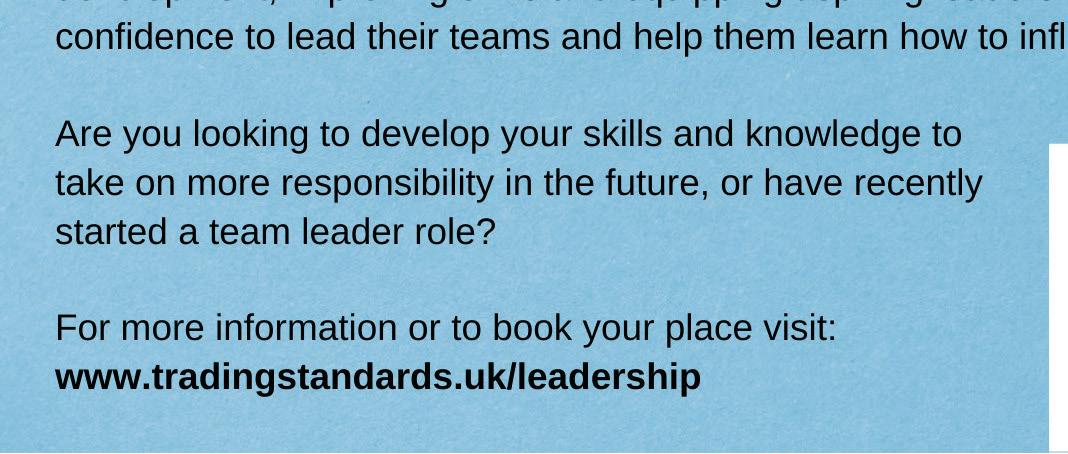
(Not including branch fees) Annual fees (1) Annual fees (2) Annual fees (3) Standard fees 2023 rates With early payment discount 2023 rates With direct debit discount 2023 rates
fee)
membership
2023
Leading
profession
nothinggreatsavings–extratopay
Full membership £136 £131 £126 Chartered Trading Standards Practitioner (addn.
£50 N/A N/A Associate membership £91 £88 £84 Retired membership £45 £44 £42 Affiliate membership £68 £66 £63 Student membership £44 £42 CTSI
fees
www.tradingstandards.uk
the trading standards
makepaymentsSpreadyourand
£45
Untitled-1 1 11/05/2022 11:46:53
We are the UK partner in the React Anti-counterfeiting network
Created in 1997, React UK are an independent company with more than 20 years' expertise and experience in the anti-counterfeiting industry.
Created in 1997, React UK are an independent company with more than 20 years' expertise and experience in the anti-counterfeiting industry.
Created in 1997, React UK are an independent company with more than 20 years' expertise and experience in the anti-counterfeiting industry.
Created in 1997, React UK are an independent company with more than 20 years' expertise and experience in the anti-counterfeiting industry.
Created in 1997, React UK are an independent company with more than 20 years' expertise and experience in the anti-counterfeiting industry.

React UK acts as the first and only point of contact on behalf of over 100 brands, for all law enforcement agencies including Police, Trading Standards, Customs and Border Force in relation to the identification and investigation of the supply and manufacture of suspect counterfeit products.
React UK acts as the first and only point of contact on behalf of over 100 brands, for all law enforcement agencies including Police, Trading Standards, Customs and Border Force in relation to the identification and investigation of the supply and manufacture of suspect counterfeit products.
React UK acts as the first and only point of contact on behalf of over 100 brands, for all law enforcement agencies including Police, Trading Standards, Customs and Border Force in relation to the identification and investigation of the supply and manufacture of suspect counterfeit products.
React UK acts as the first and only point of contact on behalf of over 100 brands, for all law enforcement agencies including Police, Trading Standards, Customs and Border Force in relation to the identification and investigation of the supply and manufacture of suspect counterfeit products.
React UK acts as the first and only point of contact on behalf of over 100 brands, for all law enforcement agencies including Police, Trading Standards, Customs and Border Force in relation to the identification and investigation of the supply and manufacture of suspect counterfeit products.
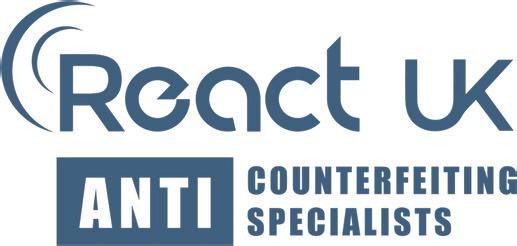
Contact us:
Contact us:
Contact us:
Contact us:
Contact us:
Tony Williams
Stephanie Jackson
We are the UK partner in the React Anti-counterfeiting network
We are the UK partner in the React Anti-counterfeiting network
We are the UK partner in the React Anti-counterfeiting network
We are the UK partner in the React Anti-counterfeiting network
Tony Williams
Tony Williams
Tony Williams
Tel: 07788 140607
Stephanie Jackson
Stephanie Jackson
Stephanie Jackson
Tel: 07788 140607
Tel: 07786 194191
Tel: 07786 194191 Email: stephanie.jackson@react.uk.net
Tel: 07786 194191
Email: stephanie.jackson@react.uk.net
Stephanie Jackson Tel: 07786 194191 Email: stephanie.jackson@react.uk.net
Tel: 07786 194191 Email: stephanie.jackson@react.uk.net
Email: stephanie.jackson@react.uk.net
React UK | Unity House | Westwood Park | Wigan | WN3 4HE
React UK | Unity House | Westwood Park | Wigan | WN3 4HE
Tel: 07788 140607 Email: twilliams@react.uk.net www.react.uk.net
React UK | Unity House | Westwood Park | Wigan | WN3 4HE
React UK | Unity House | Westwood Park | Wigan | WN3 4HE
React UK | Unity House | Westwood Park | Wigan | WN3 4HE
Law Enforcement Investigations Brand Protection Training
Law Enforcement Investigations Brand Protection Training
Tel: 07788 140607 Email: twilliams@react.uk.net www.react.uk.net
Law Enforcement Investigations Brand Protection Training
Law Enforcement Investigations Brand Protection Training
Email: twilliams@react.uk.net www.react.uk.net
Tony Williams Tel: 07788 140607 Email: twilliams@react.uk.net www.react.uk.net
Email: twilliams@react.uk.net www.react.uk.net
Law Enforcement Investigations Brand Protection Training



























































 SIMON WILKES HEAD OF WORCESTERSHIRE REGULATORY SERVICES
SIMON WILKES HEAD OF WORCESTERSHIRE REGULATORY SERVICES








































































